Curriculum Guide flourish



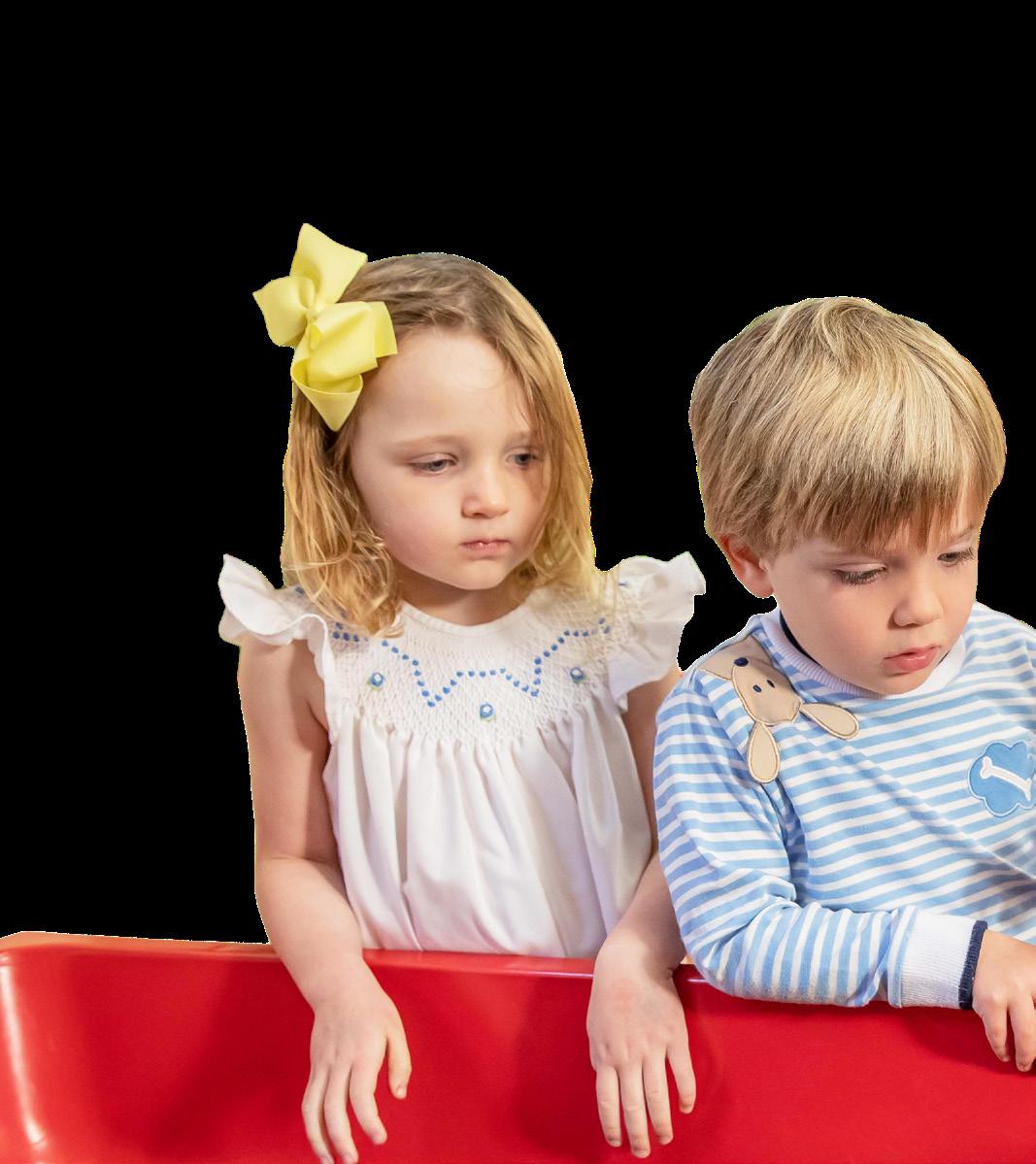
At Trinity School, our students have opportunities to discover and explore. Their innate intellectual curiosity is sparked in an academically challenging environment. Children don’t just grow here – they flourish.
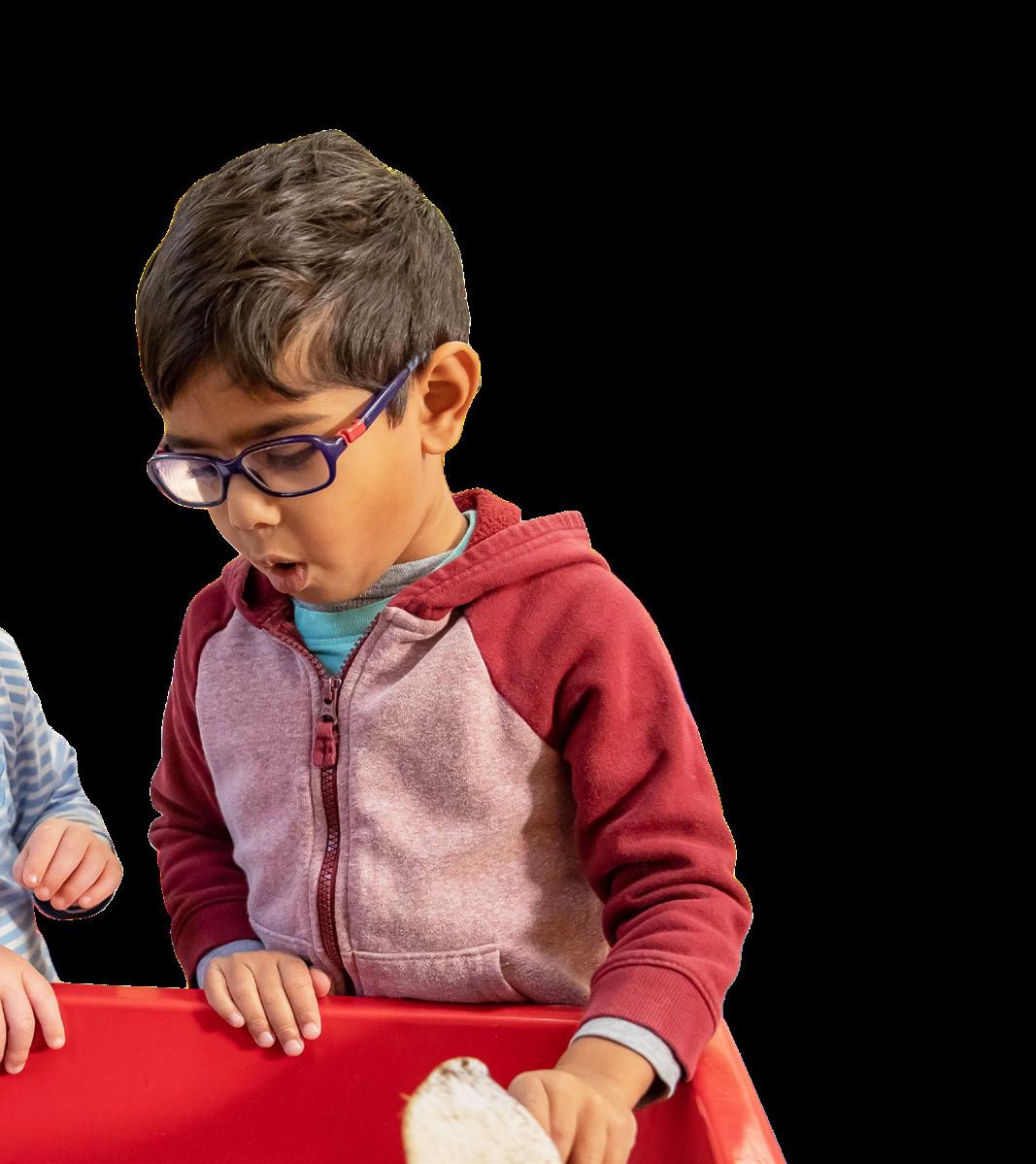
Trinity school provides an exceptional educational experience for all its students by empowering learners in a nurturing environment that cherishes childhood. Talented and inspiring teachers implement engaging lessons that foster curiosity, creativity, and confidence. The curriculum is intentionally designed to ensure that students learn age-appropriate material and experience dynamic learning.
Instructional methods allow students to gain knowledge of various content areas and explore specific topics and concepts to unearth passions and discover the excitement, richness, and joy of learning. This approach fosters deep levels of meaningful understanding and builds a solid academic foundation while developing character in our students.

If you have any questions about Trinity’s curriculum, please contact Director of Curriculum Marsha Harris at
mharris@trinityatl.org


Mission and Program
Our Diverse Community
Subject Areas
Language Arts
Mathematics
Science
Social Studies
Art
Character Education and Leadership
Media and Technology
Music
Physical Education
Social-Emotional Learning
World Languages
Early Elementary Division
Early Learners
Pre-K Kindergarten
First Grade
Upper Elementary Division
Second Grade
Third Grade
Fourth Grade
Fifth Grade
Sixth Grade
The Trinity Experience is based on core learning principles that are interwoven throughout every grade level. Whether it is an Early Learner experiencing what it means to work as part of a group, a First Grader honing reading and mathematic fundamentals, or a Sixth Grader exploring global connections between self and society, each child’s educational journey is rooted in the cornerstones of Trinity School’s mission and program and pedagogy pillars.
Serving children age three through Sixth Grade, Trinity School creates a community of learners in a diverse and distinctly elementary-only environment, in which each child develops the knowledge, skills, and character to achieve his or her unique potential as a responsible, productive, and compassionate member of the School and greater community.
Celebrating the present and preparing our students for the future within a nurturing and caring educational environment, we:
Cherish Childhood. We provide joyful experiences that include playand passion-based learning; ensure developmentally appropriate experiences; and design those experiences around what is important in the life of a child.
Deepen Students’ Educational Experiences. We develop students’ creative, critical thinking, and questioning skills; value both the process and product of learning; and connect learning vertically, horizontally, cross-curricularly, and globally.

Empower Students in Their Learning. We foster a growth mindset; cultivate voice, choice, and self-reflection; and develop and promote leadership skills.
So that our students:
Build Academic Foundation. They establish proficiency in essential knowledge and skills and embrace the diverse experiences of a well-rounded education.
Develop Character Foundation. They exhibit ethical skills, habits, and attitudes of empathy, integrity, and respect and demonstrate performance skills, habits, and attitudes of accountability, persistence, and resilience.
Exhibit Continued Curiosity, Creativity, and Confidence. They imagine, discover, and experiment independently and collaboratively and adapt to new situations and a changing world.
Quick Links
Table of Contents
Subject Areas
Early Elementary Division
Upper Elementary Division
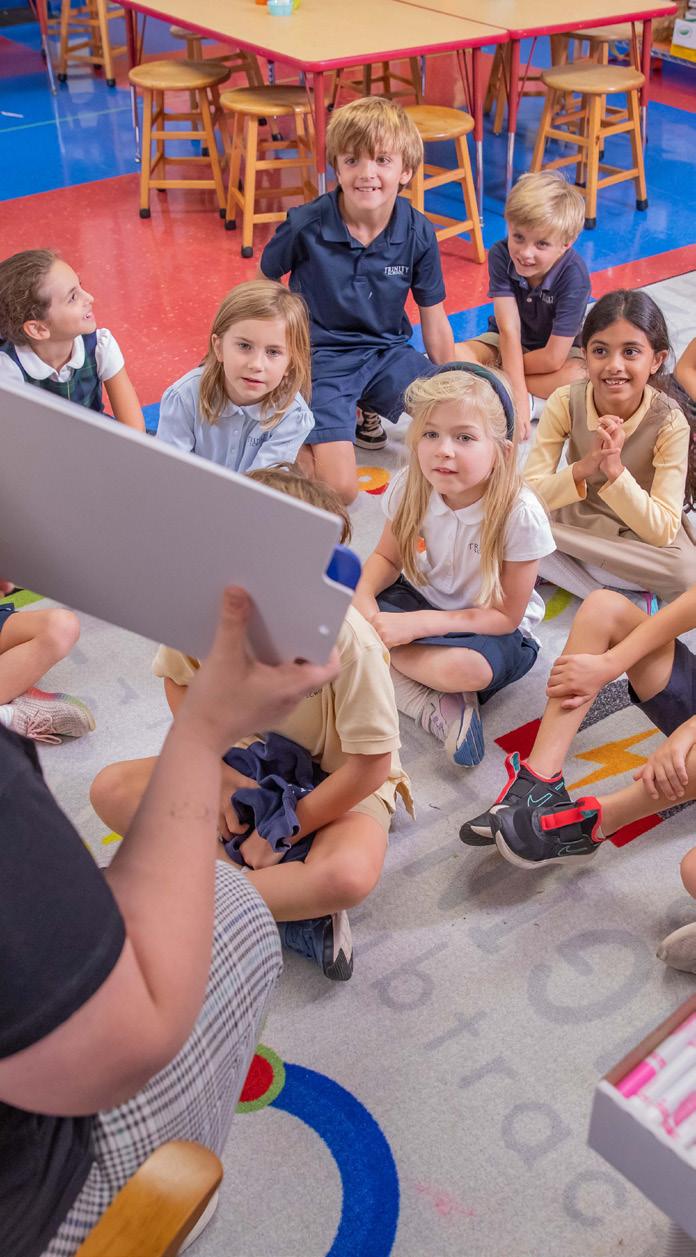
Trinity welcomes children of diverse backgrounds and provides experiences that foster acceptance, mutual respect, trust, and cooperation among the students, their teachers, and their parents.

In 1963, Trinity School became the first racially integrated private school in Georgia. Trinity’s enduring commitment to diversity encompasses and celebrates individual value and worth and the belief and understanding that differences and varied perspectives enrich our community. Diversity is an ever-present, integrated part of our school day, our program, and our pedagogy.
We help our students find commonalities, respect differences, and think from multiple perspectives. We instill in and model for our students the following core values: acceptance, belonging, empathy, fairness, honesty, respect, responsibility, and togetherness. We value the power of dialogue, foster acceptance, and embrace an attitude of continual growth and learning for all. We guide every student to develop a strong sense of self and belonging; to treat others with dignity, fairness, and respect; and to cultivate sincere, empathetic care and concern for others. In age-appropriate ways befitting an early childhood, elementary-only school, we emphasize the importance of treating everyone with dignity and being fair, supportive, empathetic, and kind to everyone.
Trinity School respects and protects the dignity and worth of all members of its community. We are enriched by the diversity of our families, teachers, and students. Learning derives from listening to and sharing one another’s stories. Integrated throughout the curriculum, diversity is celebrated each day, and students are encouraged to bring their full selves to school, to ask questions, and to be accepting of each other’s differences as an integral part of a learning community.
Quick Links
Table of Contents
Subject Areas
Early Elementary Division
Upper Elementary Division
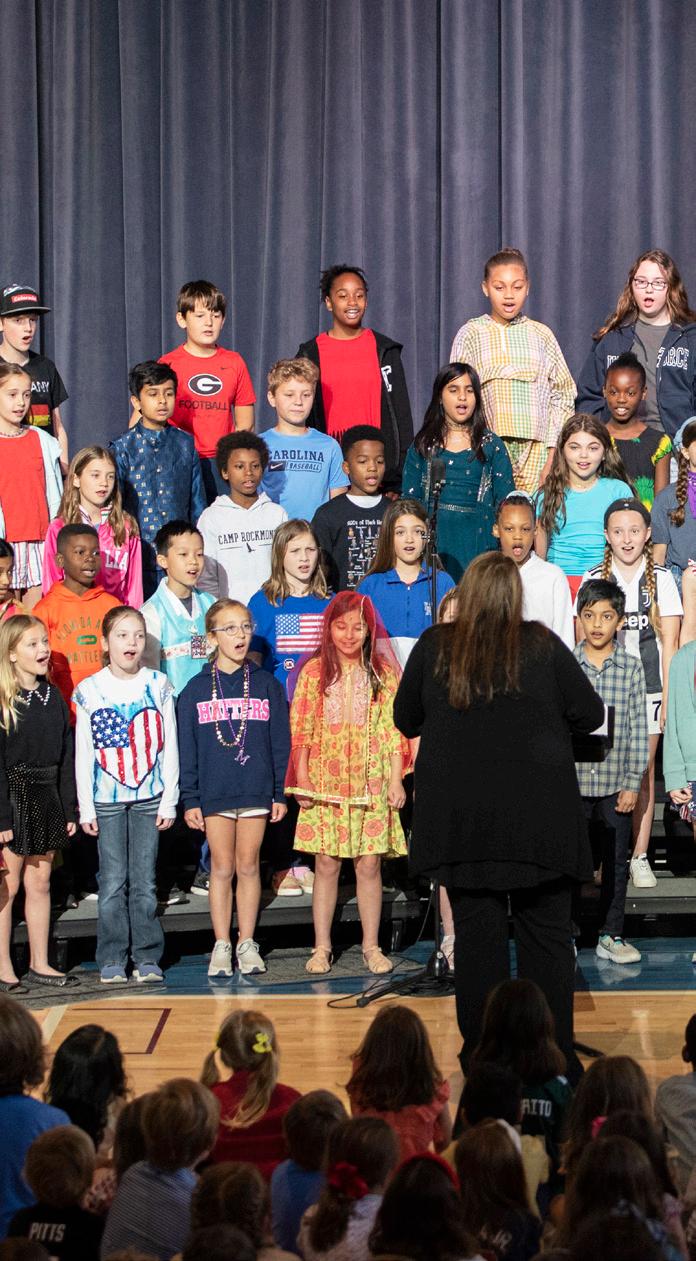

Trinity School guides students to take charge of their learning, encouraging them to pursue their interests in a safe and nurturing environment. We design joyful, meaningful activities and experiences that build upon students’ innate curiosity to further excite and engage them about learning. At Trinity, learning through play is an essential part of deep learning and understanding, not only in the early childhood years. While learning at Trinity is fun, purpose and intentionality, supported by educational research and the success of our graduates, undergirds all we do toward our goal of developing a strong academic and character foundation in our students.
Read on to learn more about the subject areas and our students goals for each one.
Quick Links
Table of Contents
Subject Areas
Early Elementary Division
Upper Elementary Division
Language Arts
Mathematics
Science
Social Studies
Art
Character Education and Leadership
Media and Technology
Music
Physical Education
Social-Emotional Learning
World Languages
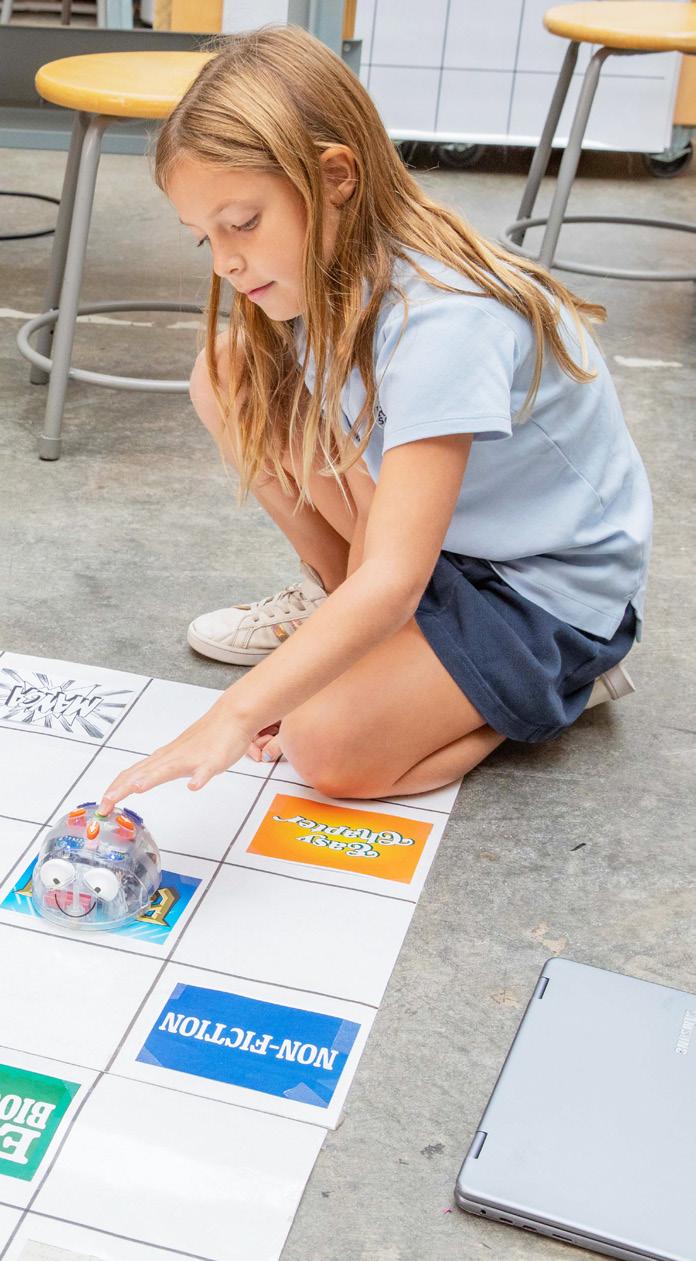
At Trinity, young readers and writers build stamina, share reading experiences, and express themselves through retelling, drawing, and writing. Our instruction is composed of intentional lessons on various reading and writing strategies through modeling, active engagement, and sustained work time. Teachers confer and guide students at their instructional level so that they can build skills and habits to become confident communicators.
An explicit, direct, and systematic approach to literacy instruction is crucial for our young learners as they develop essential foundational skills. Phonological awareness and phonics instruction support the backbone of our reading and writing program. As students learn how to distinguish between individual sounds (phonemes), the symbols that represent those sounds (graphemes), and parts of words (syllables), they begin to understand how words are formed and are able to tackle decoding (reading) and encoding (spelling). Trinity Teachers have access to high-quality resources that support science and research through methods and practices that are crucial in building literacy skills from Early Learners through Sixth Grade.
Trinity students are known for their ability to boldly communicate in front of their peers and teachers. They learn to speak clearly, tell stories, share ideas, and teach one another at a very young age. Beginning with Pre-K nursery rhyme presentations and ending with Sixth Grade Capstone presentations, our students leave Trinity knowing that they can proudly stand in front of an audience and speak with confidence.
Student goals include:
• Developing a strong foundation of phonological awareness skills such as identifying and manipulating units of oral language and individual sounds at early and advanced levels.

• Applying spelling rules through a multi-sensory approach so that students learn to decode (read) and encode (spell) words fluently.
• Reading out loud fluently.
• Developing a rich vocabulary through storybook reading and listening to others.
• Mastering reading comprehension, which is the culmination of all the reading skills.
Quick Links
Table of Contents
Subject Areas
Early Elementary Division
Upper Elementary Division
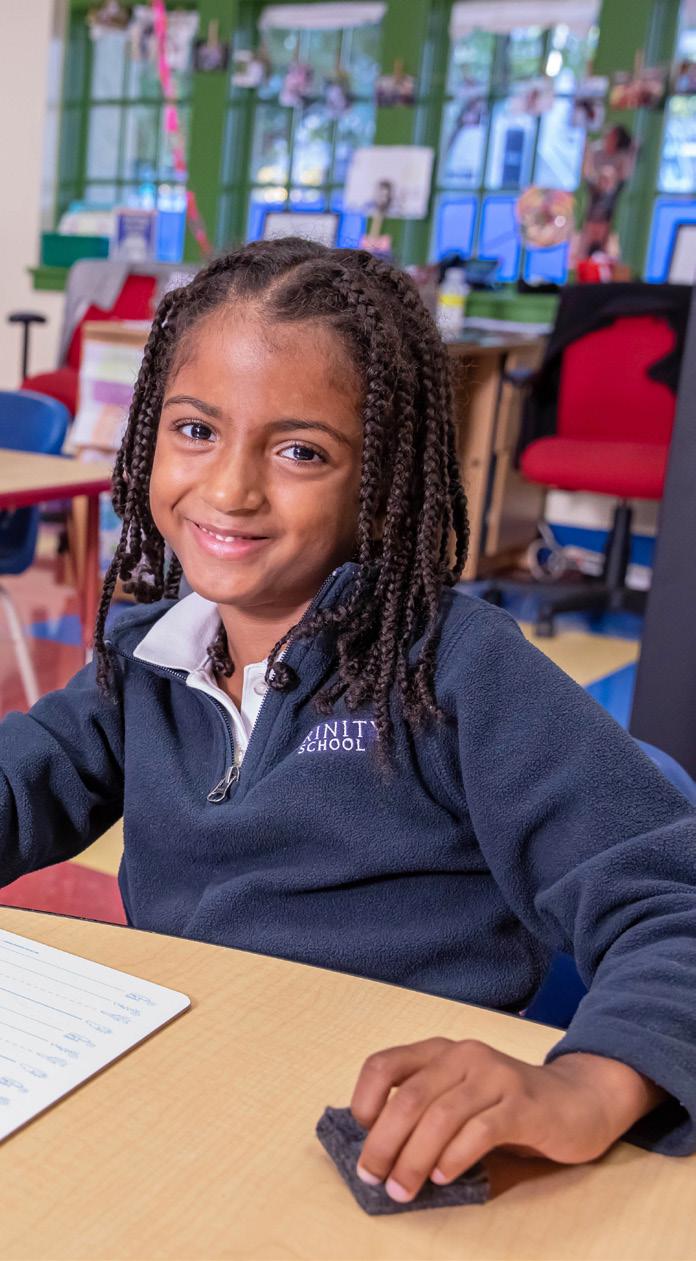
At Trinity School, we know that every child can become a successful mathematician. Thinking critically, problem-solving, and demonstrating number flexibility lead students to make real-world connections. Our students learn that mistakes are a necessary part of growth and learning. Taking the time to reflect, question, share, and listen to others deepens their mathematical understanding.
Through play and hands-on exploration, students learn how to make connections, organize information, and persevere in solving problems. We are committed to instilling a lifelong love of mathematics by providing engaging and challenging opportunities to learn through making mistakes, productive struggle, and perseverance, all which lead to success.
Student goals include:
• Building confidence and competence by taking risks and learning from successes and failures.
• Making sense of problems and persevering in solving them.
• Developing flexibility, fluency, and efficiency of skills and processes.

• Attending to precision with math vocabulary and symbols.
• Building conceptual understanding, moving from the concrete to the abstract.
• Developing and applying multiple strategies for solving problems.
• Constructing mathematical arguments and kindly offering helpful feedback to others.
• Transferring and applying mathematical concepts across the curriculum.
• Reflecting deliberately throughout the learning process.
Quick Links
Table of Contents
Subject Areas
Early Elementary Division
Upper Elementary Division
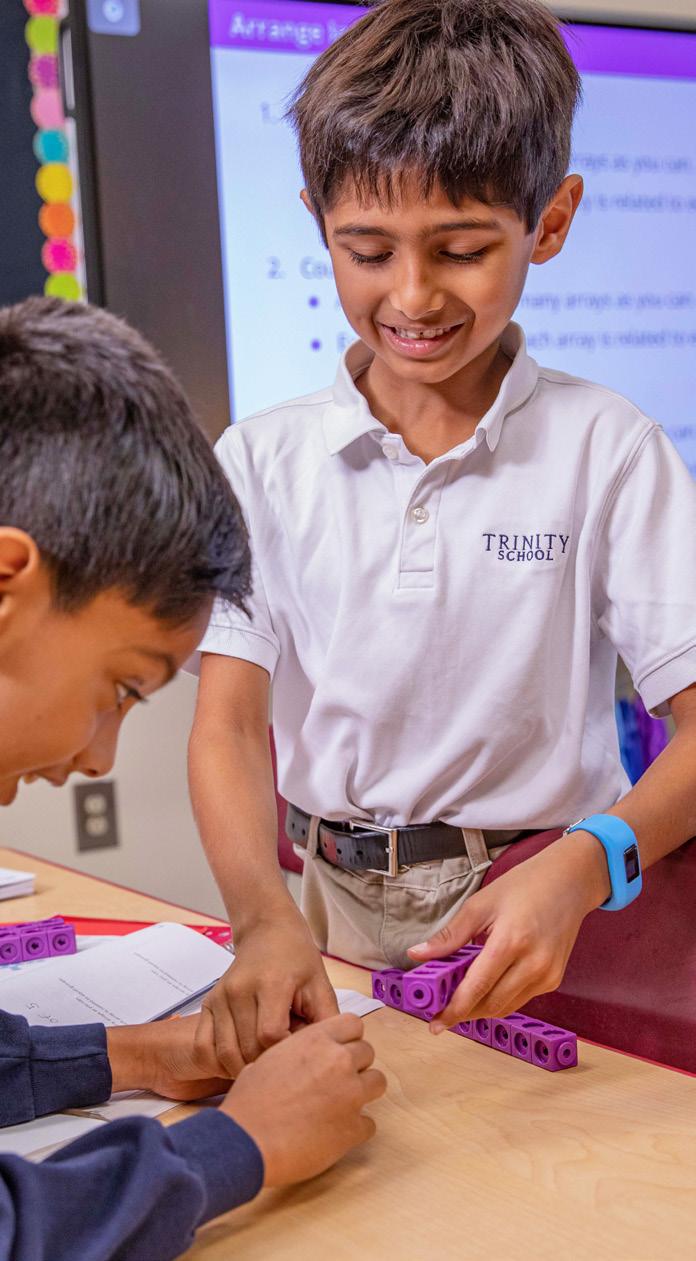
Our science program instills in children a sense of wonder about the world and cultivates the confidence and skills necessary to seek the answers to their questions. Using an integrated approach, teachers guide students to question, explore, and discover the world around them and to value and apply science in all areas of life. Through an extensive variety of handson experiences, each student builds upon and implements scientific process skills while thoroughly exploring select content themes.
Student goals include:
• Investigating and constructively exchanging ideas.
• Applying the scientific method to answer questions, both teacher and student generated.
• Taking risks and learning from successes and failures.
• Learning and applying scientific process skills.

• Developing a sense of responsibility for maintaining a healthy environment.
• Taking responsibility for maintaining a healthy mind and body.
• Integrating skills and concepts learned across all disciplines.
• Creating unique and innovative solutions to problems.
• Reflecting deliberately throughout the learning process.
Quick Links
Table of Contents
Subject Areas
Early Elementary Division
Upper Elementary Division
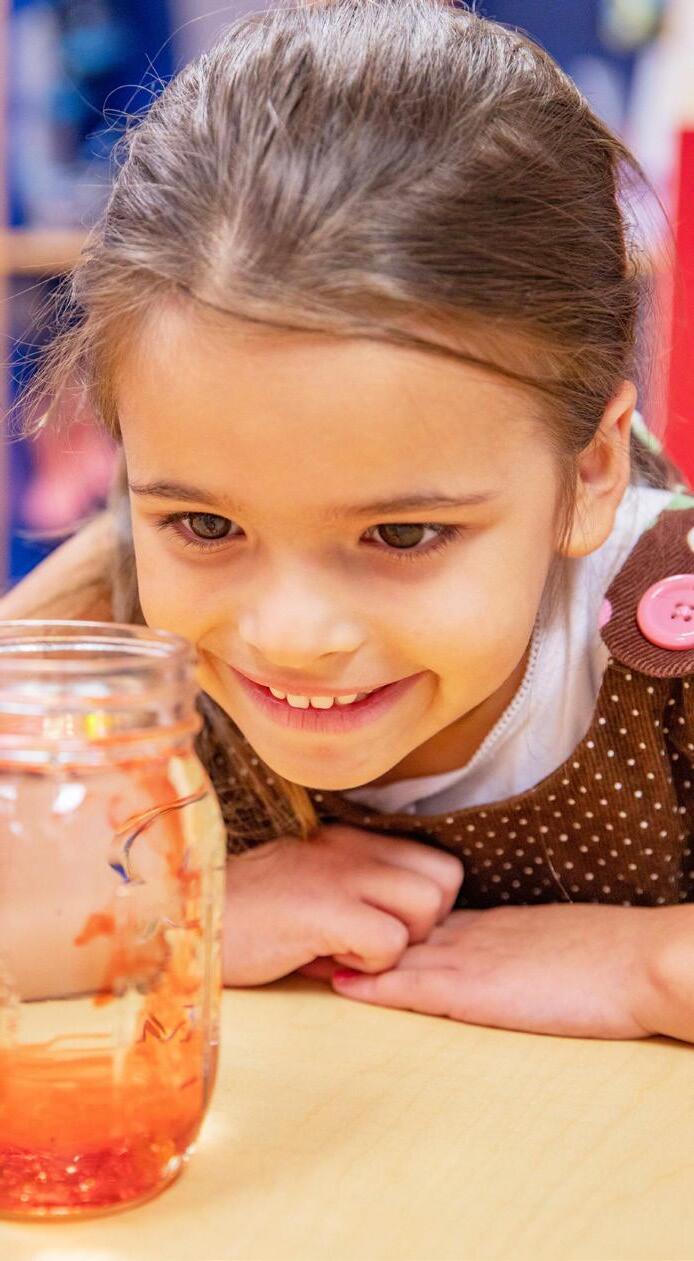
Our social studies program builds upon children’s natural curiosity about the world and their place within it. Through active learning, immersion, and cross-curricular integration, students develop an understanding of how the past is connected to the present and the impact of people and events on the future. With an emphasis on culture, perspective, and conflict, teachers guide students to recognize their role as citizens in both their immediate and global community. Students also acquire a strong foundation in geography, history, cultural studies, economics, and political science, as well as a true understanding of civic responsibility.
Student goals include:
• Investigating and constructively exchanging ideas.
• Developing skills to interact in a cooperative learning setting to reach a common goal.

• Acknowledging the value of others’ perspectives and abilities.
• Learning and applying organized research methods to answer questions, both teacher and student generated.
• Learning and applying geography skills.
• Developing a sense of civic responsibility.
• Integrating skills and concepts learned across all disciplines.
• Creating unique and innovative solutions to problems.
• Acquiring an understanding of the interdependence of various aspects of social studies.
• Reflecting deliberately throughout the learning process on all life experiences.
Quick Links
Table of Contents
Subject Areas
Early Elementary Division
Upper Elementary Division
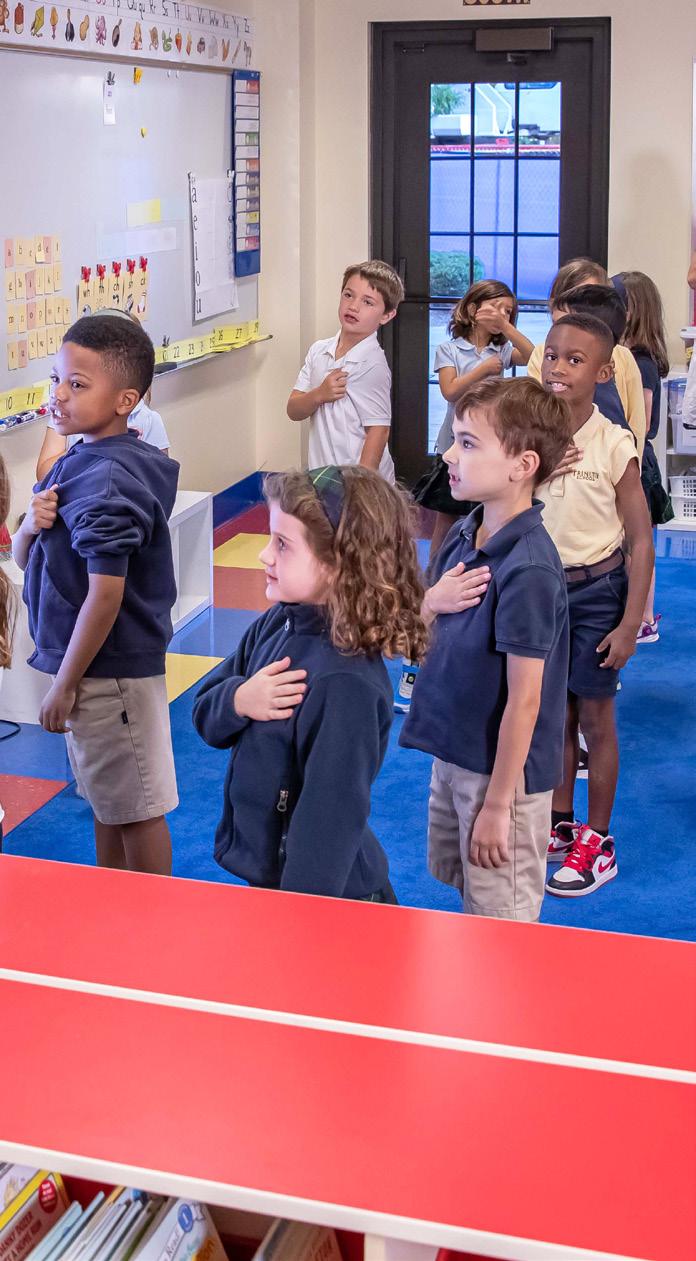
An integral component of educating the whole child, our art program builds on a child’s natural need for self-expression and a sense of wonder. Students understand how all cultures use the visual arts to share their history, values, and aesthetics. Through exploration and teacher guidance, students develop alternative means of expressing ideas, experiences, and stories. Visual problem solving promotes new ways of thinking, working, communicating, reasoning, investigating, and evaluating. Each student builds upon and implements art process skills while exploring context and individual expression. The elements and principles of design are foundational. At the same time, joy, discovery, and confidence are nurtured and celebrated.
A spiraling curriculum, art balances process with product. Activities are designed to enhance visual perception so that students “see” the world around them with heightened awareness. They progress developmentally, moving from exposure to various art media to manipulating and creating at increasing levels of complexity.
Student goals include:
• Developing fine motor skills.

• Creating unique and innovative art.
• Learning, applying, and synthesizing art process skills.
• Collaborating throughout the artistic process.
• Developing an appreciation for art in its various forms.
• Taking risks and learning from successes and failures.
• Building a storehouse of visual images.
• Integrating skills and concepts learned across all disciplines.
• Reflecting deliberately throughout the artistic process.
Quick Links
Table of Contents
Subject Areas
Early Elementary Division
Upper Elementary Division
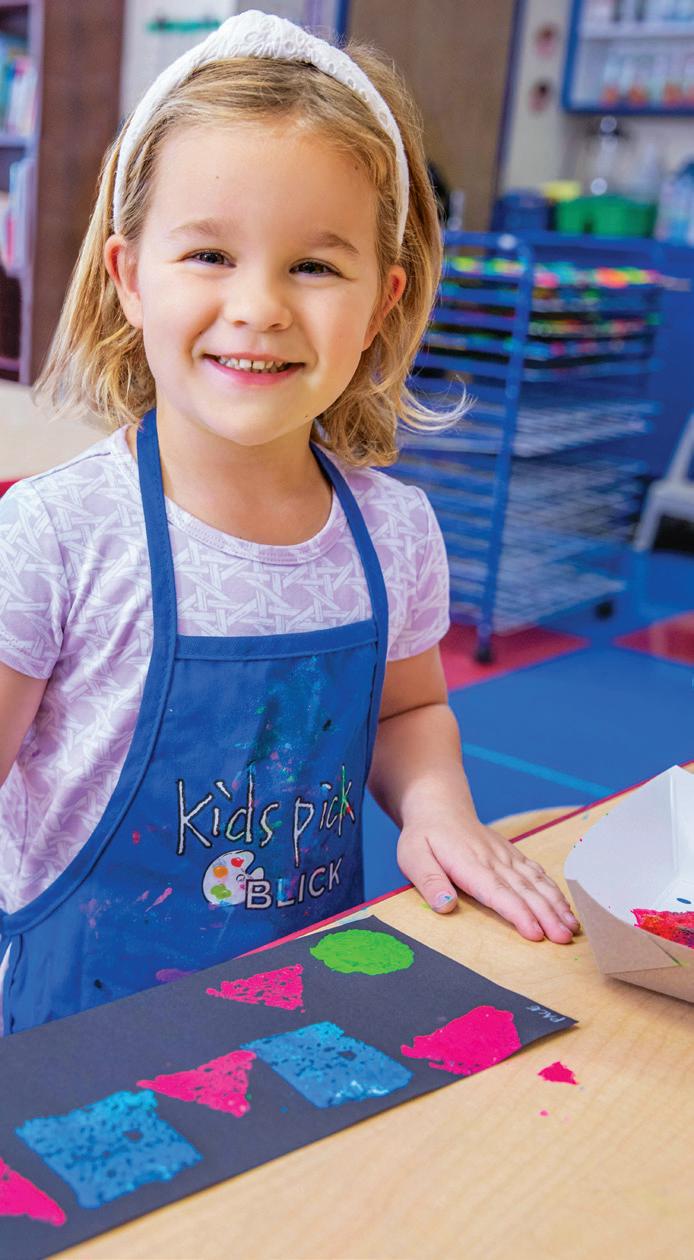

Building character and values are integrated into every aspect of Trinity’s culture and curriculum. Character development is particularly evident in the outcomes of Positive Discipline; activities like classroom jobs and Morning Meeting; and mentor programs, such as the Buddy and the Big Kid/Little Kid programs. Trinity intentionally creates experiences that allow students to learn about consideration for others, responsibility, compassion, cooperation, and kindness. Additionally, our students develop social responsibility through developmentally appropriate community and service-learning projects. Students at every grade level are encouraged to feel comfortable in their own skin, be individuals of integrity, express empathy, and demonstrate respect for others. They discern right from wrong, lead by example, and have moral courage.
The Sixth Grade Leadership class offers students opportunities to identify and explore their strengths and challenges as leaders and learners. They will deep dive into self-assessment of their character qualities and values and how these apply to serving as Trinity’s Leadership Class and beyond. They will hone and enhance skills of organization, note-taking, and study techniques as they prepare for their next steps in academia. Students will develop critical public speaking and presentational skills for their Capstone Project as well as their future leadership opportunities.
Quick Links
Table of Contents
Subject Areas
Early Elementary Division
Upper Elementary Division
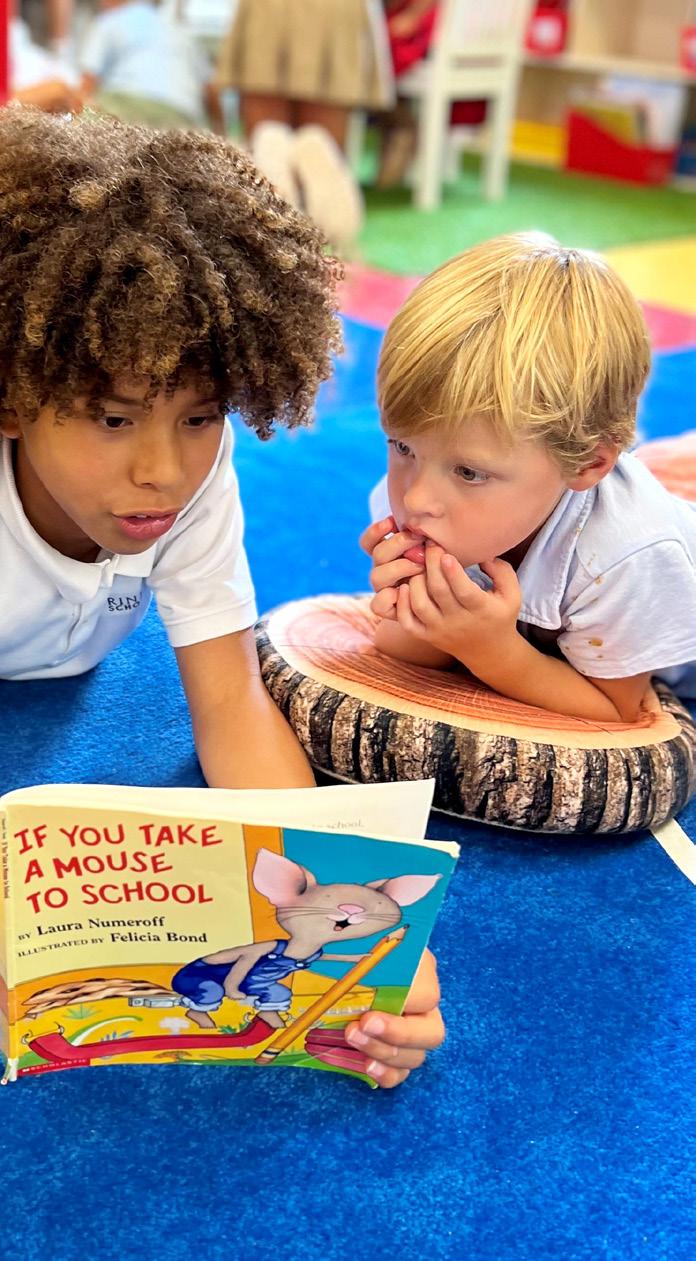
A core tenet of our philosophy is that students are exposed to a variety of topics and pedagogies so that they are able to explore their individual interests and passions. This has resulted in the intentional development of a curriculum that challenges students through the use of traditional books, digital resources, and tools to fabricate materials. Through these, students can make connections and transfer understanding through a variety of resources and experiences. We believe students are innately curious and learn best when they ask questions, play, and explore to develop their own understanding.
The Overend Learning Commons space is an integral part of each student’s daily educational experience. In this environment, students are encouraged to choose, discover, and experiment with a wide variety of literature, digital resources, and organizational tools. The Learning Commons offers opportunities to enhance academic concepts and explore individual passions. Embedded within the teaching of core media concepts, we challenge students to be critical consumers of digital and print media.
Education technology at Trinity School is intentionally designed to enable students to be positive, safe, respectful, and responsible digital citizens. We provide age-appropriate experiences with the latest in educational software and hardware to ensure our students are engaged with developmentally appropriate digital tools. Lessons are developed to deepen classroom learning and challenge students to think critically, communicate clearly, and collaborate with peers so that they are prepared for the digital world outside Trinity’s gates.
Trinity believes students need the opportunity to manipulate materials to find workable solutions to real-world problems. As a result, we have developed a curriculum and innovation hub (iHub) that educates each student on the foundations of engineering and design principles. It is our belief that when students engage in their curiosities, ask questions, and develop prototypes to solve problems, they are connecting with the real world in an experiential model that excites them. The iHub is a space where children can build, imagine, engage, and explore with new tools and skills. Whether it’s part of science or language arts, the connection between the classroom and the iHub is designed to deepen our students’ educational experiences.

Quick Links
Table of Contents
Subject Areas
Early Elementary Division
Upper Elementary Division
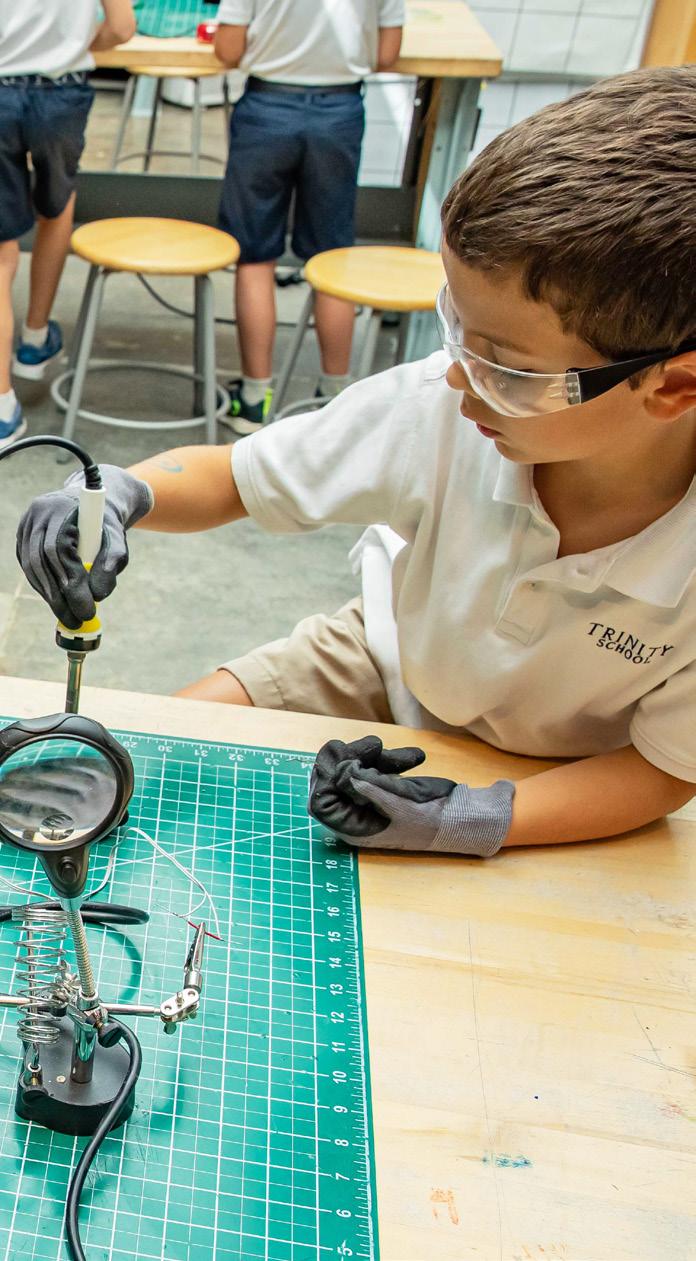
Trinity’s music program uniquely embraces a sequential and intentionally designed curriculum that is developmentally appropriate for all learners. An integral component of educating the whole child, the music builds on a child’s natural need for self-expression, sense of wonder, and imagination. Laying a solid foundation of musical understanding and musicianship, our program nurtures and celebrates the individual child and the joy he or she derives from music every day.
Through exploration and teacher guidance in singing, moving, playing instruments, dramatizing, and composing, students develop avenues of self-expression and appreciation. Music education promotes critical thinking and problem-solving skills, fosters collaboration, and connects to learning across academic and cultural experiences.
Student goals include:
• Developing a mastery of musical skills.

• Building a repertoire of aural recognition.
• Developing music literacy.
• Recognizing and expressing one’s response to music.
• Appreciating music in its various forms.
• Understanding music in relation to history and culture.
• Integrating skills and concepts learned across all disciplines.
• Relating to and interacting with one another through music.
• Taking risks and learning from successes and failures.
• Performing for an audience.
Quick Links
Table of Contents
Subject Areas
Early Elementary Division
Upper Elementary Division
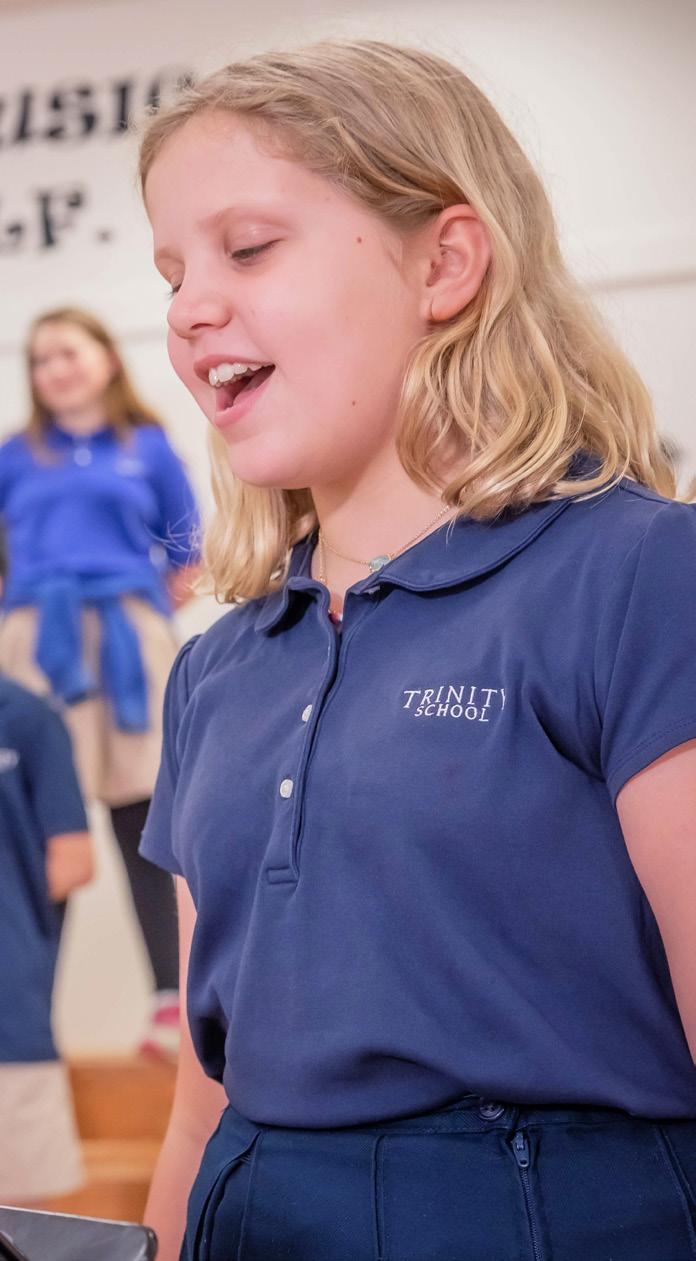
Trinity’s physical education (P.E.) program is committed to empowering all students to choose a healthy and active lifestyle. Developmentally appropriate experiences enable students to gain confidence, develop resilience, and maintain a positive self-concept.

Participating in an environment that fosters care, empathy, and mutual respect enables students of all ability levels to thrive and achieve their own personal goals. Through a balanced approach to competition and teamwork, intentional focus enables students to gain strategies for leadership and sportsmanship. Students develop a strong foundation of lifelong skills that enables them to apply concepts and strategies through critical reasoning and decision making to work and play collaboratively.
Student goals include:
• Developing and maintaining a physically active and healthy lifestyle.
• Gaining confidence to pursue athletic endeavors.
• Exhibiting sportsmanship; being a positive group member and leader.
• Developing body and spatial awareness.
• Understanding skills, strategies, and rules of individual and team sports.
• Pursuing personal physical fitness goals.
• Developing problem-solving strategies through cooperative learning and leadership opportunities.
• Taking risks and developing resiliency.
Quick Links
Table of Contents
Subject Areas
Early Elementary Division
Upper Elementary Division


At Trinity School, we believe social and emotional development goes hand in hand with academic development. Our mission statement and program and pedagogy pillars anchor the School’s focus on the social and emotional wellbeing of children along with their academic development. “Cherishing childhood” is not just something we say. It’s something that is lived out in every decision we make. To “cherish childhood,” we guard and guide the social and emotional development of our young learners.
A Trinity school day is a joyful time filled with multiple opportunities for social and emotional development. We begin the day with a Morning Meeting, which is an intentional time for relationship building and interpersonal connection. Our Trinity Traditions, from the Pre-K Olympics to Sixth Grade Outdoor Education Trips, are opportunities for our students to find their own voice and self-confidence. Recess is student directed because we know that students learn about creativity, fairness, reciprocal relationships, conflict resolution, and more through play. Our students learn to collaborate as they work in table groups. The word “yet” is part of our everyday vocabulary to show that we embrace a growth mindset.
Student goals include:
• Exhibiting a growth mindset evident in embracing mistakes and the word “yet.”
• Becoming effective problem solvers both academically and socially.
• Developing empathy with a deep appreciation of differences.
• Demonstrating a positive sense of self and mastery of self-regulation.
• Feeling a strong sense of belonging in the school community.
• Taking risks and developing resiliency.
Quick Links
Table of Contents
Subject Areas
Early Elementary Division
Upper Elementary Division
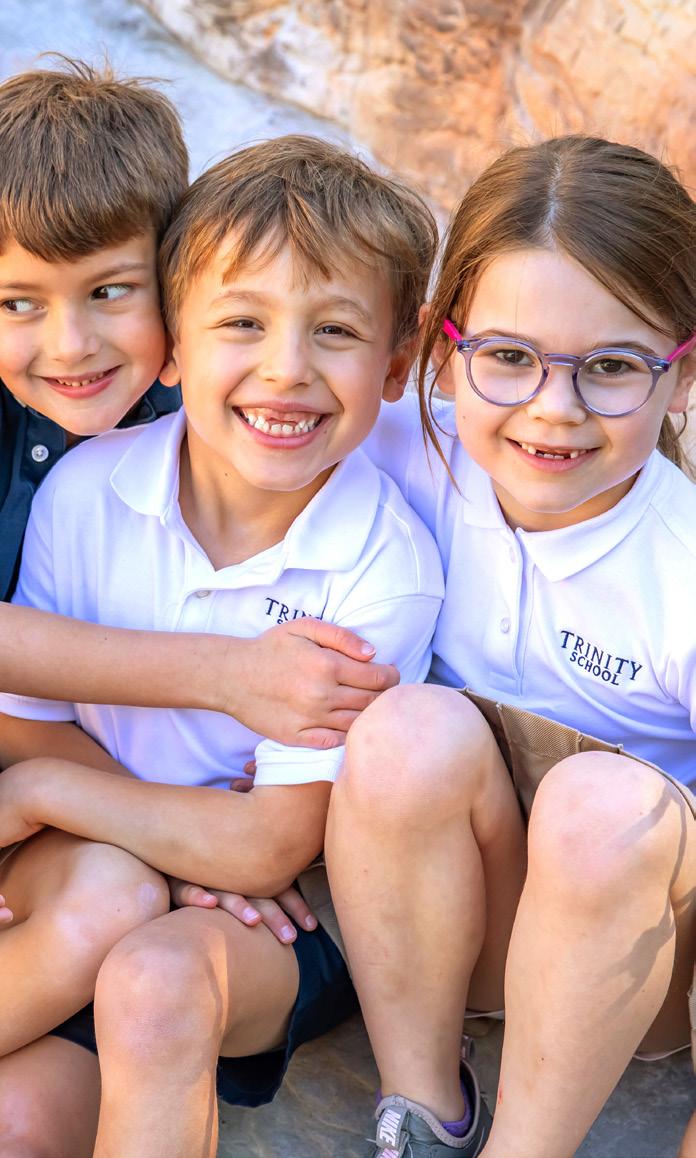
Our World Languages program uses a spiraling curriculum, balancing expressive and receptive language and emphasizing a conceptual understanding of its structure. Our model moves beyond basic vocabulary to encompass listening, speaking, reading, and writing. Our program is focused on content and themes that provide opportunities for storytelling, role-play, and real-life situations. We concentrate on the developmental skills of listening, speaking, and cultural competency through authentic experiences such as stories, music, and cuisine.
The study of Spanish or French is a vital component of our students’ learning and offers rich opportunities to integrate across disciplines. A deliberate focus on cultures provides the context for the study of the language and the framework to make connections in an expanding global community.

Student goals include:
• Experiencing the joy of learning a new language.
• Building confidence and competence.
• Taking risks and learning from successes and failures.
• Building vocabulary and grammar skills to facilitate basic conversation and understanding.
• Expressing ideas and opinions in a different language.
• Integrating skills and concepts across disciplines.
• Acknowledging the value of other cultures.
• Understanding the need for acquiring another language.
• Recognizing the role language plays in connecting world cultures.
Quick Links
Table of Contents
Subject Areas
Early Elementary Division
Upper Elementary Division
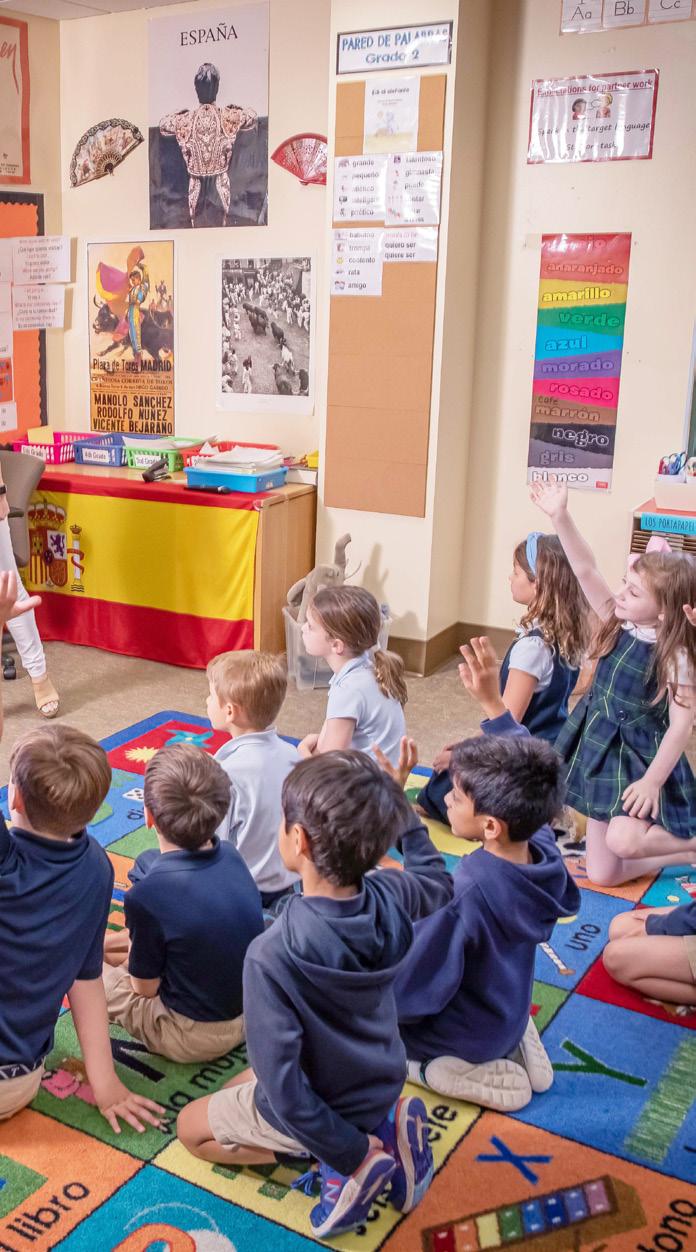
Our Early Elementary Division, Early Learners (three-year-olds) through First Grade, is all about learning to love learning.
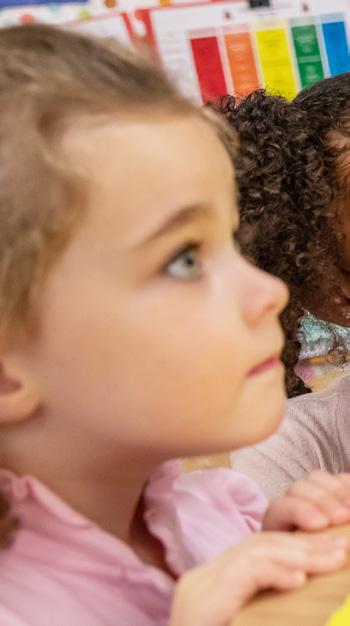
Your child will run to her classroom, eager to start a new day at Trinity. She will be immersed in a language-rich learning environment, one with dedicated time to arts, music, movement, classroom responsibilities, public speaking, group discussions, and hands-on exploration and discovery. Your child is building a solid foundation for his future academic achievement as he masters the basics of literacy, numeracy, and Spanish or French.
He will enjoy engineering and design puzzles, media center time, visiting authors and scientists, service learning projects, and an innovative physical education program. Your child will be in a constant state of inquiry and experimentation, emboldened by our safe and nurturing environment. When your child advances from the Early Elementary Division to the Upper Elementary Division, she moves forward with the knowledge that she has a voice in her learning and can achieve anything through hard work and dedication.
Read on to discover more about the joyful experiences that await Early Elementary Division students.
Quick Links
Table of Contents
Subject Areas
Early Elementary Division
Upper Elementary Division
Early Learners
Pre-K
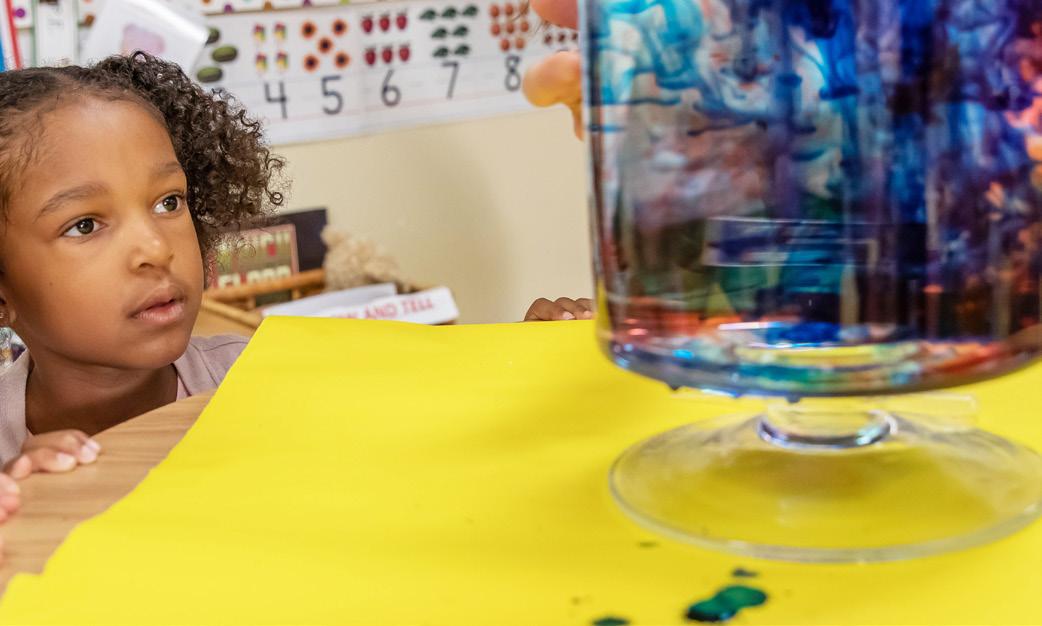
Kindergarten
First Grade
The Total Trinity Experience begins between ages three and four in the Early Learners program. A daily routine gives our youngest elementary students a sense of security, along with spontaneous opportunities for learning both in and outside of the classroom. From visiting Discovery Woods to venturing into the music room, each day is filled with experiences that delight and challenge these young learners.
A child-centered environment matches the growing skills and competencies of students’ individual needs while at the same time inviting open-ended exploration. Learning through both guided and free play, growing socially and emotionally, and strengthening fine and large motor skills are hallmarks of Trinity School’s Early Learners program. These students also grow and develop cooperative play, share, and take turns with one another.
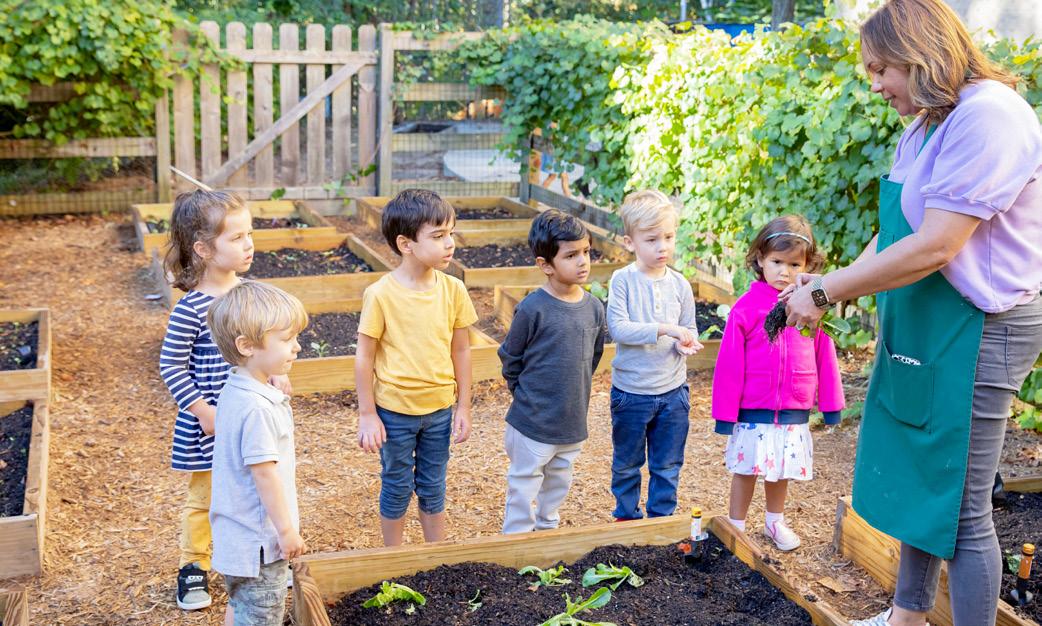
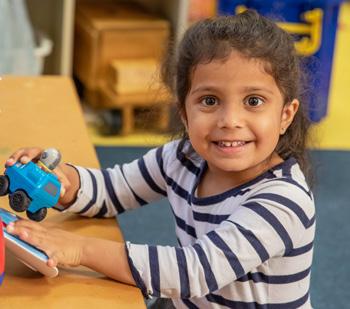
Table of Contents
Subject Areas
Early Elementary Division
Upper Elementary Division
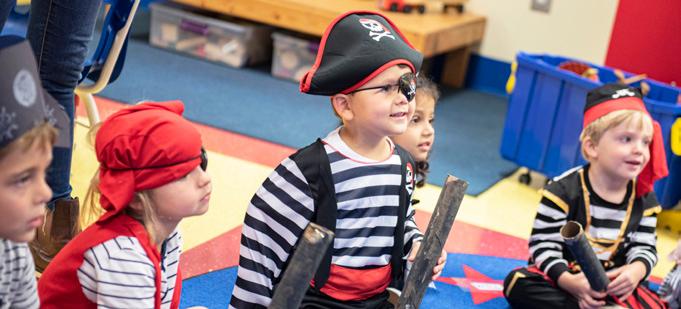
Language Arts
• Explores concepts of print while reading a book or picture walk.
• Recognizes title, author, and illustrator; uses left to right progression; and turns pages.
• Begins to identify the elements of a story, characters, setting, beginning, middle, and end.
• Recognizes and names most uppercase letters.
• Identifies and produces rhyming words and beginning and ending sounds.
• Understands that letters make words and that sentences are made of words.
• Begins to write by drawing, labeling, and telling.
• Participates in group conversations in which students learn to express thoughts and feelings in complete sentences.
• Explores fine motor development skills through cutting, pencil grip, drawing, and writing their first name.
• Recognizes and extends simple and complex patterns.
• Identifies attributes of and names basic shapes.
• Classifies and sorts by attributes.
• Uses math language in story contexts and read alouds.
• Knows the number names and their sequence, demonstrates cardinality, and counts out quantities to eight.
Science
• Uses observational skills to make predictions and asks questions about the world around them.
• Explores the senses of taste, smell, touch, sight, and hearing.
• Identifies different types of weather and seasons.
• Explores the concept of community, beginning with our school.
• Listens to and follows classroom agreements.
• Learns responsibility through classroom jobs.
• Understands that there are people in our community who help us and that they have different jobs.
• Identifies various forms of transportation.
• Participates in various holidays in the United States and around the world.
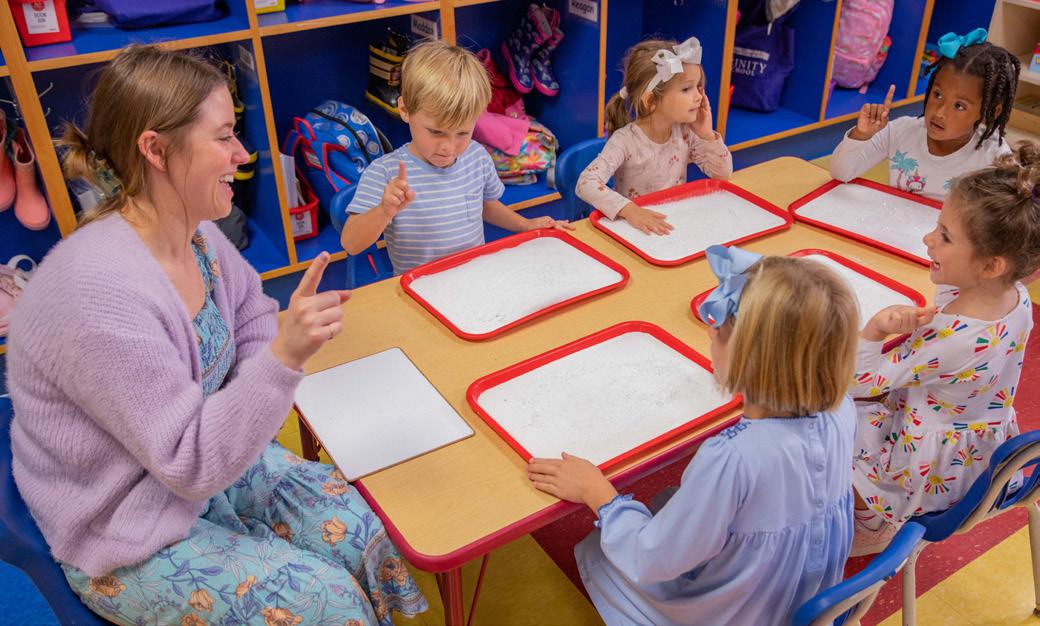
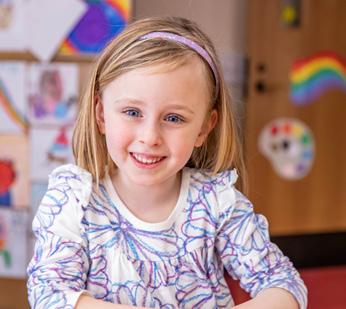
With help from the runaway “Gingerbread Man” during the first week of school, students in Pre-K become acquainted with all the places and faces at Trinity School! Teachers focus on helping students develop a strong sense of self and healthy relationships with others, thus Pre-K students possess pride in themselves, their friendships, and their work.
Through the creation of personal journals, playing letter and word games, and sharing literature in large and small groups, the students’ language-rich environment develops the foundations for early literacy. The Pre-K Olympics, one of Trinity’s most beloved traditions, is a highlight for not only the students and parents, but also the entire school community. This event allows these young learners to shine as they demonstrate their learning about various countries and display their athleticism.
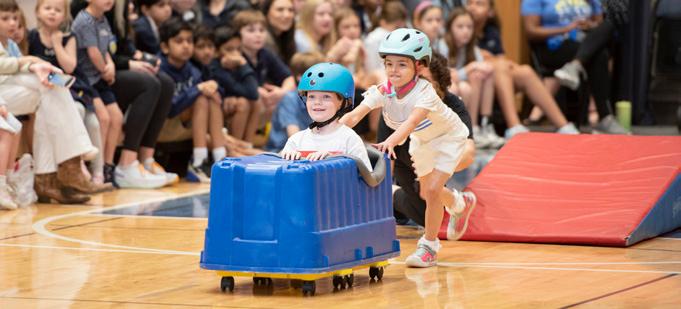
• Forms uppercase letters and identifies their names and sounds.
• Retells the elements of known stories, characters, settings, events, and conclusions.
• Develops ideas for writing and illustrates details within their stories.
• Begins to write stories with approximated spelling to express their ideas.
• Develops early literacy skills through rhymes, compound words, syllables, and beginning/ ending sounds.
• Understands that letters have sounds that form words and sentences.
• Listens to and follows classroom agreements.
• Participates in cooperative discussions, expresses thoughts and feeling, and asks questions.
• Knows number names and sequence, recognizes and writes numerals, counts out quantities to 12, knows the successive counting number is one more, subitizes within five.
• Represents quantities in addition and subtraction math stories or read alouds using actions, fingers, objects, and drawings.
• Identifies, extends, and describes simple and complex patterns.
• Identifies, describes, and combines shapes.
• Makes observations and predictions about the world around them through a science lens.
• Explores the five senses through hands-on experiences and communicates their findings.
• Explores water concepts of absorb, repel, sink, and float.
• Learns about the weather, seasons, and how animals adapt throughout the year.
• Understands that we are part of a community.
• Becomes familiar with our school community.
• Explores different cultures around the world by learning about customs, traditions, and celebrations.
• Learns the importance of helping others through community service projects and acts of kindness.
With countless opportunities “to delight in discovery,” Kindergartners are passionate about each day as a Trinity student. Building on the early literacy and math foundations established in their first years of formal schooling, Kindergarten students work to develop the skills and strategies necessary to apply knowledge independently.
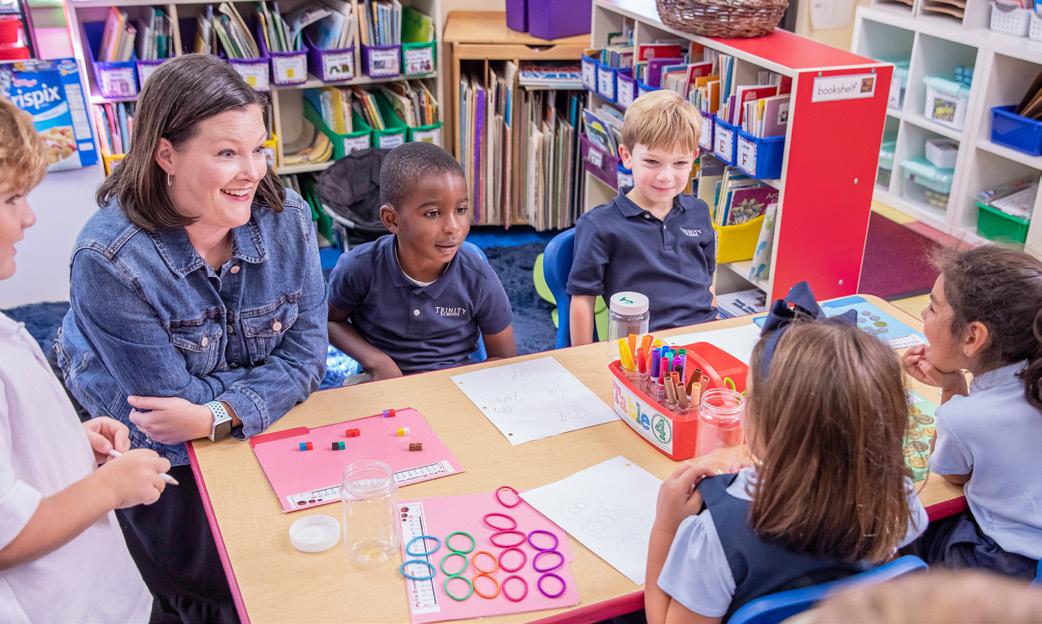
With a focus on deepening their conceptual understanding of math and constructing strong reading and writing habits, students become empowered learners. Their interest in the world around them guides classroom instruction and inquiry-based learning experiences. Highlights of the Kindergarten year include caring for newly hatched eggs and becoming “Chick Masters” and going on a Trip Around the World, during which students deepen their understanding of other communities as they learn the history, geography, and culture of various countries that they “visit.”
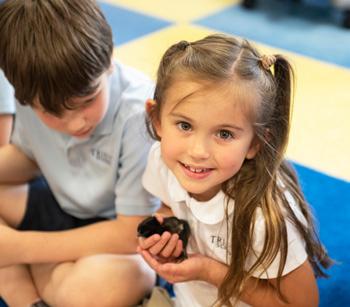
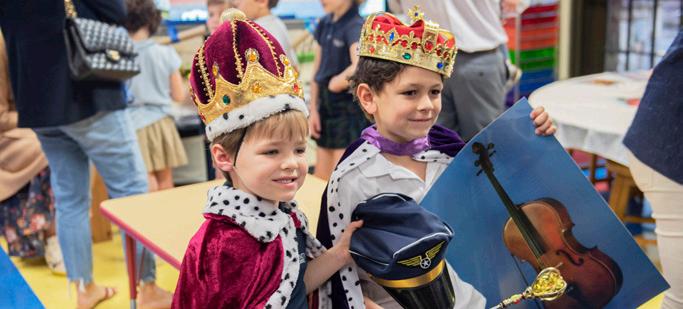
Language Arts
• Retells events, answers questions, and identifies the main idea of fiction and non-fiction text with prompts and support.
• Identifies the parts of a book, including the author, illustrator, cover, and title.
• Understands concepts of print, syllables, sounds, and rhymes.
• Read common, high frequency words.
• Produces narrative, opinion, and informative text by drawing, dictating, and writing.
• Participates in collaborative conversations with partners to develop speaking and listening skills.
• Communicates when writing or speaking with ageappropriate conventions such as capitalization, frequently occurring nouns, verbs, prepositions, complete sentences, end punctuation, phonetic spelling, and soundletter relationships.
• Knows number names and sequences, counts and compares numbers and objects.
• Understands that adding is putting together and subtraction is taking apart.
• Adds and subtracts within 10 and fluently adds and subtracts within 5.
• Works with numbers 11–19 to gain foundations for place value.
• Identifies, describes, analyzes, compares, creates, and composes shapes.
• Describes and compares data.
• Identifies, describes, and compares the seasons; explains how the weather changes with the seasons and the tools that are used to measure the weather.
• Identifies and describes the basic needs of living things.
• Explores and investigates life cycles of plants and animals.
• Learns about healthy habits and nutrition.
Quick Links
Table of Contents
Subject Areas
Early Elementary Division
Upper Elementary Division
• Explores the community that we live in and how community helpers support them through various roles.
• Compares and contrasts different cultures around the world by reading about customs and celebrations.
• Identifies various features on a map and explains the difference between a map and a globe.
Toothless grins and unbridled curiosity are certainly characteristics of Trinity School First Graders. A year of tremendous growth and development, First Graders gain independence and develop increased confidence in themselves as learners. Formal cooperative learning groups are utilized by teachers to teach both content and group skills. By the end of the year, students enthusiastically participate in teams and desire to be leaders and valued group members.
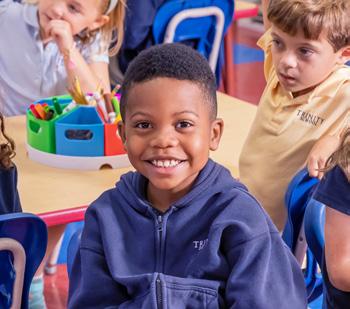
As the oldest students in the Early Elementary Division, First Graders are role models for the younger students and delight in the opportunity to be the “big kids.” The highlight of the First-Grade year is the Zoo Animal research project, book creation, and presentation. During this unit of study, students demonstrate important skills in public speaking and self-confidence. Additionally, the First Grade 101st Day of School is a cross-curricular celebration that incorporates reading, math, writing, engineering, and art.
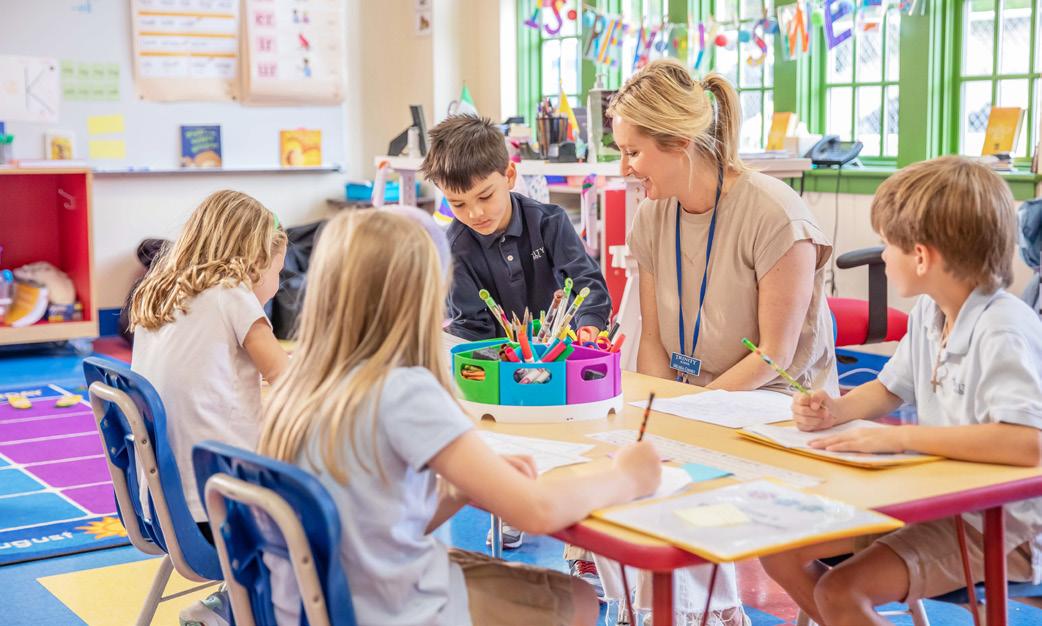
Language Arts
• Writes opinion, information, and narrative pieces using an introduction, details, sequence of events, and closure.
• Participates in short research projects to write in a sequence.
• Asks and answers questions about details in a text; retells and describes the elements of a story.
• Identifies sensory words and phrases, uses illustrations and text details to describe the elements of the story, compares and contrasts.
• Identifies parts of a sentence, syllables, long and short vowels, and consonant blends; isolates and segments phonemes and digraphs; decodes multisyllabic words.
• Reads with fluency and accuracy for comprehension.
• Uses appropriate grammar and punctuation when speaking, writing, and spelling.
• Participates in collaborative conversations and expresses ideas and feelings clearly.
• Follows classroom agreements and actively listens to follow directions.
• Adds and subtracts within 20, demonstrates fluency within 10, extends the counting sequence, and understands the relationship between the operations.
• Understands place value as 10s and 1s, uses place value understanding and properties of operations to add and subtract within 100 fluently.
• Reasons with shapes and their attributes, composes and decomposes solid and plane shapes.
• Explores measurement with time, length, and money.
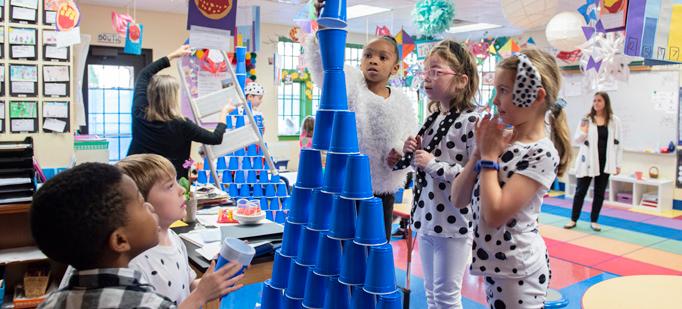
• Makes observations, predictions, and conclusions.
• Understands how to remain healthy through food, personal hygiene, and exercise.
• Explores the attraction and repulsion of magnets.
• Identifies characteristics and needs of plants and animals.
Quick Links
Table of Contents
Subject Areas
Early Elementary Division
Upper Elementary Division
• Explores how history, geography, and civics shape the state of Georgia.
• Reads about historical figures and their contributions through a diverse and balanced perspective.
• Learns about rights and responsibilities and important U.S. symbols.
• Uses map skills to locate major continents, oceans, and landforms around the world.
Moving from the Early to Upper Elementary Division (Second through Sixth Grade) is a celebrated rite of passage as your child relocates upstairs.
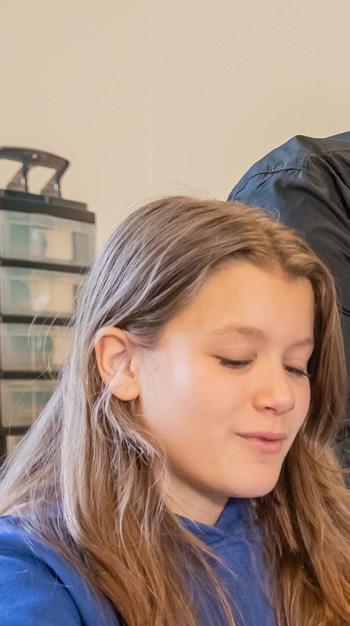
Over the next five years, your child will grow in confidence and competence as he is encouraged, challenged, and inspired. Your child will look forward to outdoor education trips, mentoring younger students, and more public speaking and performance opportunities.
Your child will experience increased academic challenge while continuing to enjoy a nurturing and empowering environment in which she can freely express ideas and opinions and learn about impact and influence. Your child will begin to lead some of his parent-teacher conferences and gain confidence in identifying areas of academic strength as well as goal setting for future progress. As your child matures, she will demonstrate the trademark qualities that Trinity students are known for: curiosity, creativity, selfadvocacy, compassion, and confidence.
Read on to discover more about the experiences that await Upper Elementary Division students.
Quick Links
Table of Contents
Subject Areas
Early Elementary Division
Upper Elementary Division

Second Grade
Third Grade
Fourth Grade
Fifth Grade
Sixth Grade
An exciting year awaits Second Grade students as they move from the Early Elementary to the Upper Elementary Division. To aid in the transition, these students receive plenty of care and attention from their base classroom and specials teachers. With a focus on study skills and the responsibility of keeping an organized binder, Second Graders gain independence and confidence in themselves.
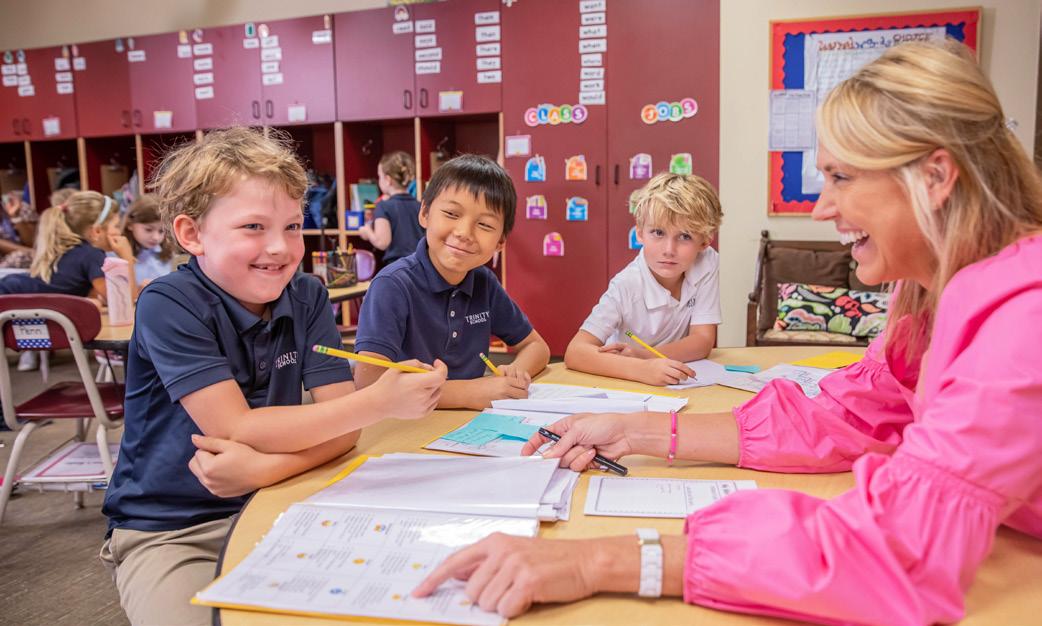
Working in cooperative base groups and conducting community service projects are ways in which these students develop greater interdependence and gain an understanding of citizenship. The highlight of the Second-Grade academic experience is studying Indigenous People of North America and participating in Trade Day. Performing in all-school productions for the first time is just one of the rites of passage our Second Graders experience.
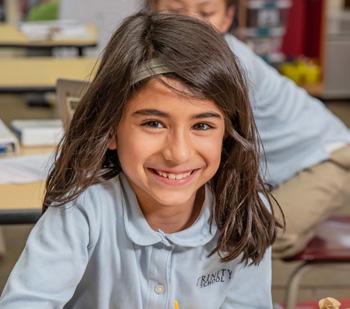
Quick Links
Subject Areas
Early Elementary Division
Upper Elementary Division
• Writes opinion pieces that support, connect, and conclude.
• Creates narratives that include a sequence of events, details, thoughts, feelings, and a sense of closure.
• Writes informational texts that introduce, use facts, and have a conclusion.
• Recounts stories, key details, and how characters respond.
• Uses information from illustrations and print to gain understanding.
• Compares and contrasts cultural stories and authors.
• Identifies the main topic of a text and the author’s purpose.
• Knows and applies phonics and decoding strategies.
• Reads fluently and accurately to support comprehension.
• Participates in shared writing and research projects.
• Has collaborative conversations and expresses feelings clearly.
• Uses appropriate grammar when speaking, writing, and spelling.
• Understands place value concepts.
• Fluently adds and subtracts within 100.
• Begins to work with equal groups to gain foundation for multiplication.
• Recognizes the need for standard units of measurement.
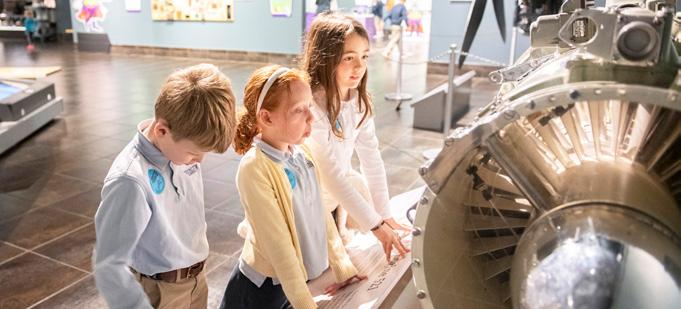
• Describes and analyzes shapes by examining their sides, angles, and attributes.
• Makes sense of one- and twostep word problems.
• Makes observations, predictions, and conclusions.
• Demonstrates changes in speed and direction using pushes and pulls.
• Explores how the sun, moon, and stars change position in the sky.
• Investigates the life cycles of plants and animals.
• Explores how history, geography, economics, and government play a part in our culture.
• Understands the importance of perspectives when learning about all facets of our history: the who, what, when, where, why, and how.
• Compares and contrasts various cultures from the past and present including Indigenous People of North America.
• Understands the reasons for exploration of the past and present.
Third Grade is the magical year when children realize the power of their own writing, thinking, and learning. They improve in time management and organization skills, which allow them to move toward becoming independent learners. A greater emphasis is placed upon following multi-step directions and thinking critically, which allow students to move from concrete to abstract thinking.
Students begin to utilize life experiences, develop a deeper understanding of concepts and the world around them, and connect these experiences to the experiences of others. Reading between the lines, Third Graders have increased comprehension and start to recognize the subtleties of humor. The Living Museum and engaging field trips are just a few of the highlights of the Third-Grade year.
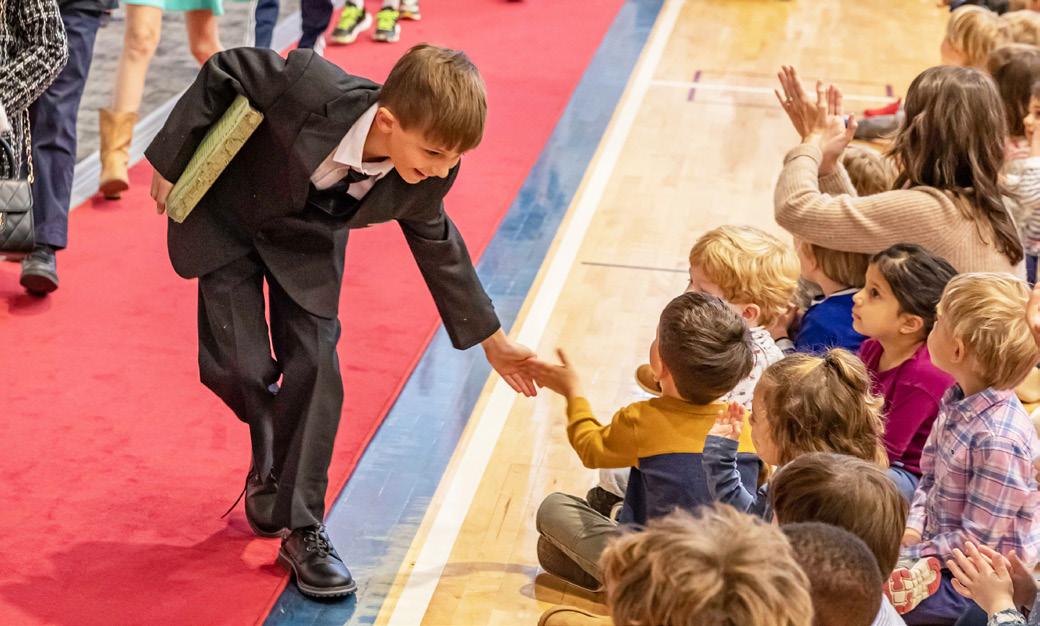
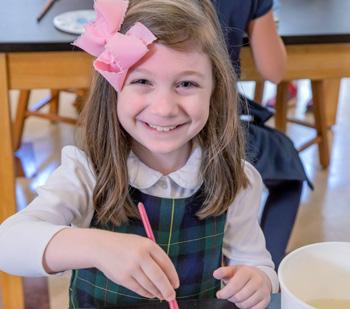
Subject Areas
Early Elementary Division
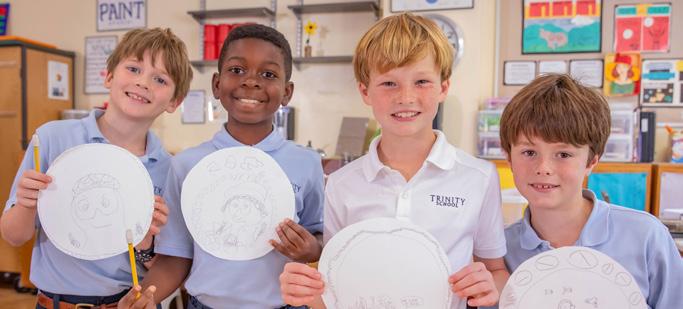
• Writes opinion pieces with an introduction, organizational structure with reasons to support opinion, linking words and phrases, and a concluding statement.
• Creates informative text with a topic, illustrations, facts, linking words, and a concluding statement.
• Writes narratives with details, clear events, dialogue, characters, and closure.
• Conducts short research projects about a topic.
• Asks and answers questions referring explicitly to the text.
• Describes characters and recounts stories.
• Compares and contrasts the themes, settings, and plots of stories written by the same author about the same or similar characters.
• Uses text features to locate information on a topic.
• Identifies meanings of prefixes and suffixes and decodes multisyllable words to understand vocabulary.
• Understands the properties of multiplication and the relationship between multiplication and division.
• Understands the concept of area as it relates to multiplication.
• Adds and subtracts fluently within 1,000.
• Understands, compares, and uses fractions; develops an understanding of fractions as numbers.
• Makes observations, predictions, and conclusions.
• Explains how animals and their habitats have changed over time.
• Demonstrates processes that shape the Earth’s surface, such as weathering and erosion.
• Identifies sources of energy and that it is transferred in different ways.
• Identifies, labels, and locates various features on a map that includes continents, topographical features, and lines of latitude and longitude.
• Explains the reasons for exploration of the past, present, and future.
• Describes the events leading up to Colonial America and explore the life of a person living during colonial times through various perspectives.
Reaching double digits in age, Trinity Fourth Graders are able to recognize, establish, and act on the many connections between curricular subject areas. Students solidify basic skills and are challenged to explore personal passions while taking risks both in and outside of the classroom. Fourth Grade students earn letter grades in math and language arts and learn essential study skills for organization, time management, and test-taking.

Through cooperative learning activities, students begin to value their personal contributions to the whole group and recognize the need for others in working towards a common goal. With greater awareness of self and others, Fourth Graders begin to establish their identity as individuals. At this critical time, they receive support in managing diverse personalities and changing friendships through class meetings and cooperative learning opportunities. The Westward Expansion experience is a hallmark of Fourth Grade.
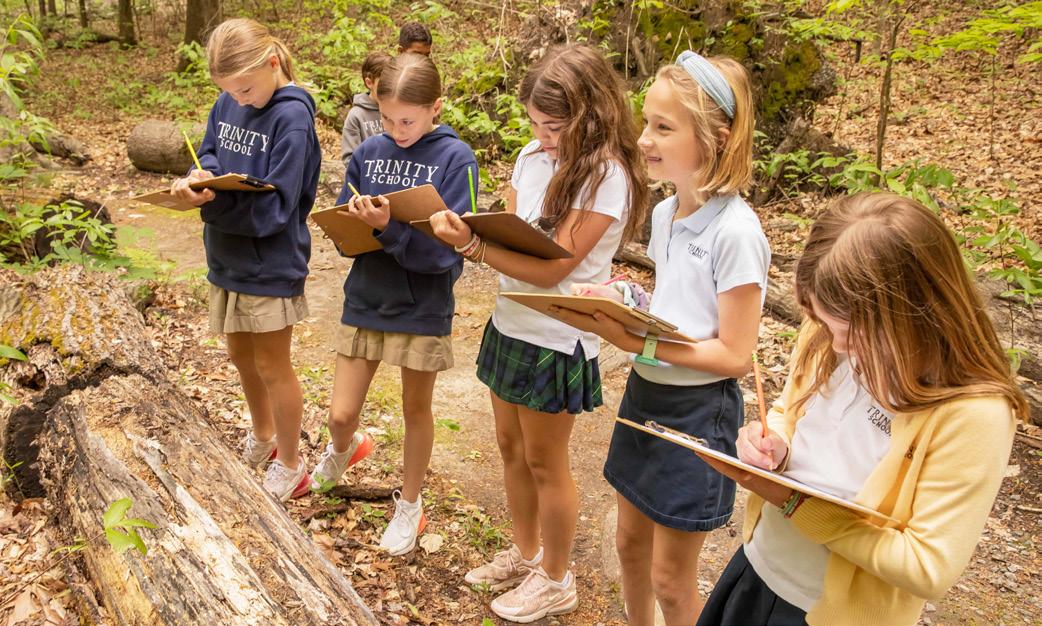
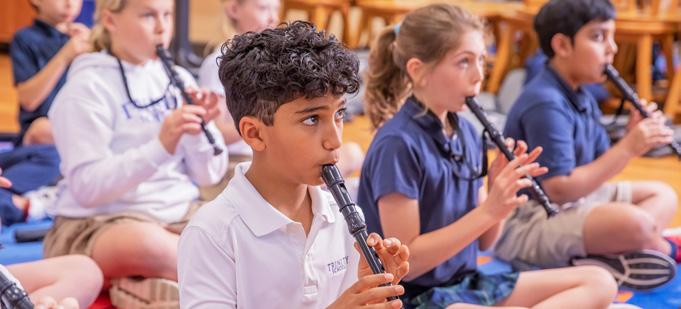
Language Arts
• Writes opinion, information, and narrative pieces with organizational structure, facts and details, linking phrases, and a concluding statement.
• Conducts short research projects and presents information with confidence.
• Draws inferences, determines theme and main idea, summarizes text, and describes the elements of a story.
• Compares and contrasts; interprets informational text.
• Develops and applies various comprehension skills to respond to literature.
• Uses knowledge of morphology to read and understand text; reads fluently and with expression.
• Contributes to group conversation and listens actively.
• Uses correct grammar when speaking, writing, and spelling.
• Demonstrates understanding of figurative language and uses common Greek and Latin roots and affixes to make meaning of words.
• Fluently adds and subtracts whole numbers up to 1,000,000.
• Uses place value understanding and properties of operations to perform multi-digit multiplication and division.
• Develops an understanding of equivalent fractions and their relationship to decimals.
• Describes, analyzes, compares, and classifies two-dimensional shapes and other elements of geometry.
• Explores unit conversions of measurement.
• Uses real-world connections to solve and create word problems.
• Makes observations, predictions, and conclusions.
• Explores the objects and systems in space and their effect on the Earth.
• Identifies the forces of flight and how they affect things that fly.
• Understands weather systems and the instruments used to measure them.
Quick Links
Table of Contents
Subject Areas
Early Elementary Division
Upper Elementary Division
• Explores the events leading up to the American Revolution and how it impacted our history through multiple perspectives and conflict.
• Learns about the three branches of government and how people can affect change through civic duty and responsibility.
• Explain the reason and impact of Westward Expansion through empathy, perspective, and conflict.
Fifth Grade, a year of growing leadership and accountability, is a year of many firsts. For the first time, students venture away from their base classrooms to learn from specialists in math and science and earn letter grades in all core subjects. Fifth Graders also enjoy their first outdoor education trips and partake in their first schoolwide theatrical performance, The Nutcracker.
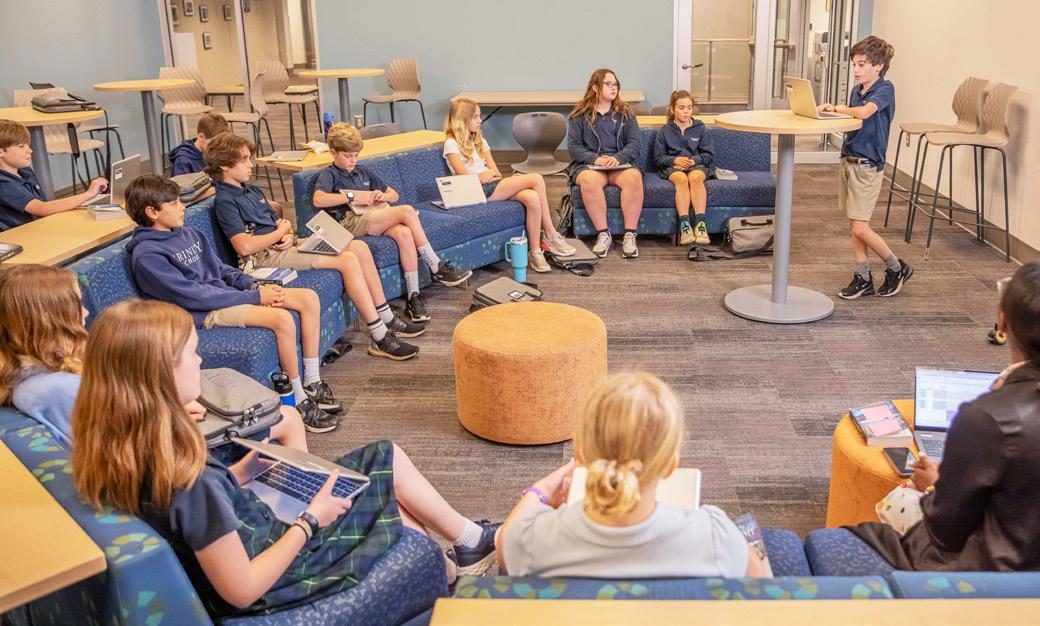
Students survey history through the concepts of conflict, multiple perspective, culture, change and continuity, interdependence, and community with opportunities to delve deeper into topics of interest. As a culmination of the year, the students synthesize information centered on major events of the 20th Century and investigate the impact these events have had on one of the biggest sporting events in history – the Olympics. Fifth Graders are members of the “Leadership Class in training” and have the opportunity to serve on Trinity’s Student Council and take on a variety of responsibilities related to the school community.
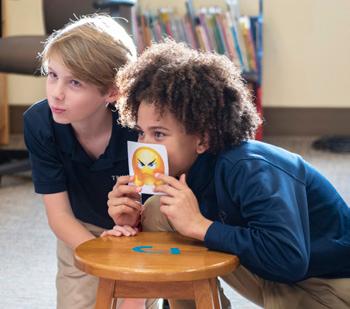
• Uses text evidence when drawing inferences, comparing characters and setting, and determining the theme when reading and responding to reading through writing.
• Compares and contrasts structure and events within two or more texts.
• Gathers information from print and digital sources, and speaks and writes confidently on the topic.
• Understands figurative language in reading and uses it in writing.
• Compares and contrasts within two or more texts.
• Reads accurately and fluently and displays literal and inferential comprehension.
• Produces clear and coherent persuasive, narrative, and expository pieces.
• Conducts and presents research projects and engages in collaborative discussions.
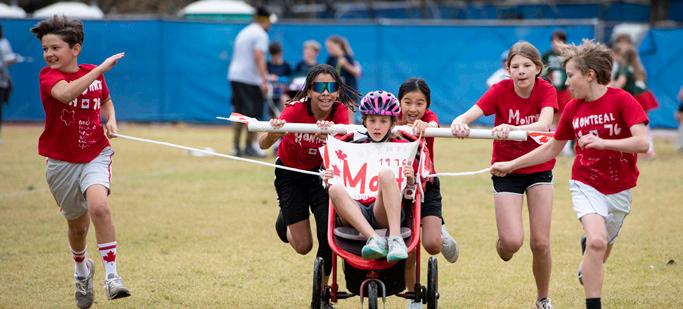
• Demonstrates command of the English language and uses correct grammar, spelling, and usage when writing and speaking.
• Builds foundation for algebraic reasoning through the analysis of patterns and relationships.
• Performs operations fluently with multi-digit whole numbers and decimals.
• Adds, subtracts, multiplies, and divides fractions.
• Solves problems involving perimeter, circumference, area, and volume of basic geometric figures.
• Investigates and observes the chemistry, organisms, ecosystems, and environmental impact on the freshwater systems of the earth.
• Engages in research and experiments with magnets and electricity.
• Learns about atoms and elements and their structure.
• Explores cell structure and function and how genetics and heredity determine our physical and behavioral traits.
Quick Links
Table of Contents
Subject Areas
Early Elementary Division
Upper Elementary Division
• Explores the history of the United States from the Civil War through present day.
• Understands the themes of culture, conflict, perspective, identity, and change through a diverse historical lens.
• Uses effective reading, writing, and research skills to engage in the topics of history, geography, and civics.
Reaching the pinnacle of the Total Trinity Experience, Sixth Graders are members of the Leadership Class. This culminating year centers on building skills that allow these students to transition from Trinity as confident, self-directed, and passionate learners and leaders. Relishing the experiences associated with the Sixth-Grade year, students leave Trinity with a sense of pride and accomplishment.
Sharing their Trinity Experience with prospective parents, serving as mentors for their “little kids,” acting in a full-scale production, completing a multi-disciplinary Capstone Project, and participating in two outdoor education trips are among the memories of Sixth Grade that our graduates will cherish.
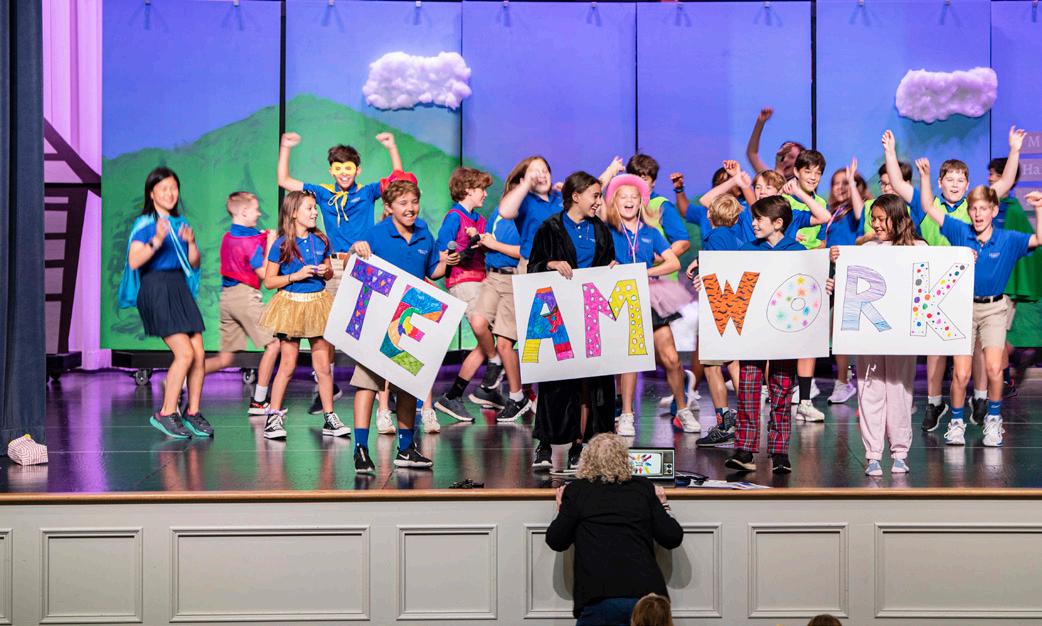

Quick Links
Table of Contents
Subject Areas
Early Elementary Division
Upper Elementary Division
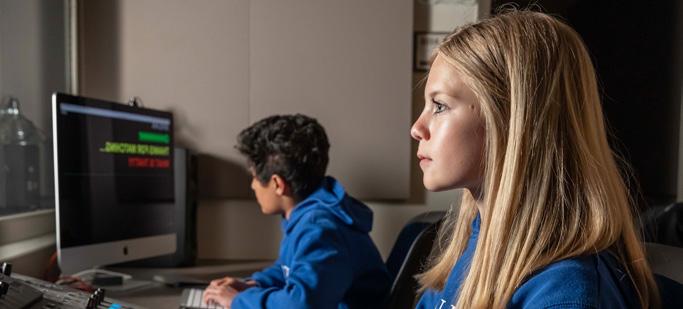
• Reads, understands, interprets, and responds to various types of text including informational, short stories, memoirs, and novels.
• Develops and crafts creative and personal narrative writing, research papers, five-paragraph literary essays, and poetry.
• Conducts research and presents a capstone project.
• Demonstrates command of the English language in spelling and punctuation.
• Understands the five themes of geography: location, place, regions, movement, and humanenvironment interaction.
• Demonstrates understanding of the connecting themes of social studies—culture; power, authority, and governance; people, places, and environment; time, continuity, and change; and individual development and identity—by interpreting them through the lens of literature.
• Begins to compose algebraic expressions through the analysis of patterns and relationships.
• Reasons and solves one-variable equations and inequalities.
• Understands ratio concepts and uses ratio reasoning to solve problems.
• Understands positive and negative numbers and uses them to represent quantities in realworld contexts.
• Develops understanding of statistical variability.
• Solves real-world and mathematical problems involving area, surface area, and volume.
• Identifies various systems of water, the topographical features, and ecosystems within.
• Understands that weather is influenced by sunlight and the ocean patterns.
• Identifies objects that can be seen in the night sky and that are in the universe.
• Explains solar and lunar eclipses, gravitational pull, and the impact of daylight and seasons.
• Explains geology, types of rocks, the rock cycle, plate tectonics, and how the Earth’s surface changes.
• Describes the changes that take place during puberty and the hormones and organs that are responsible.